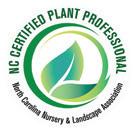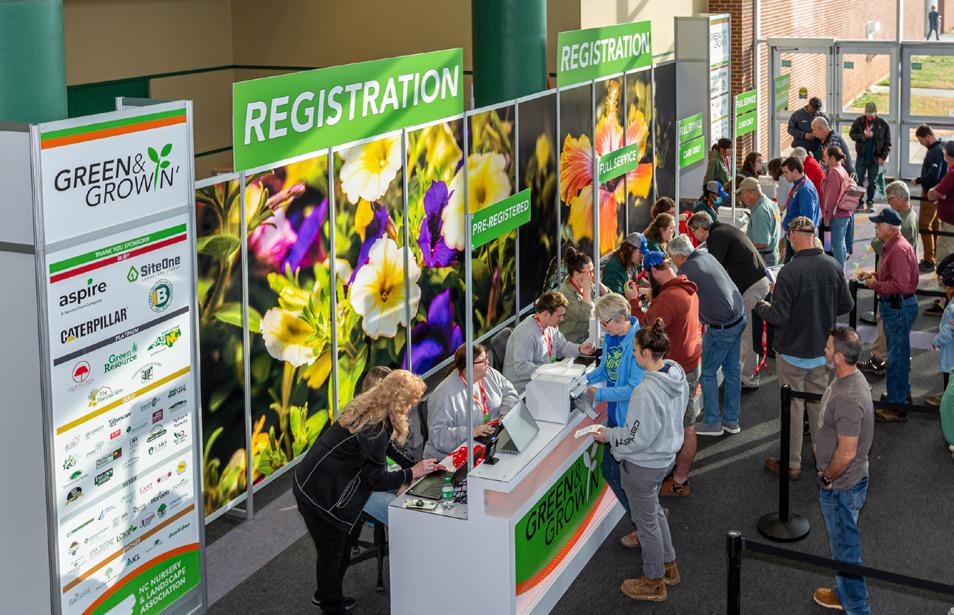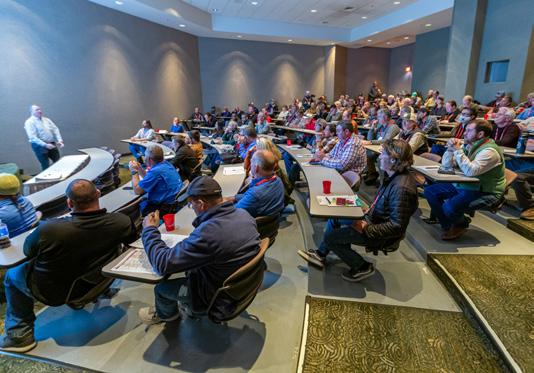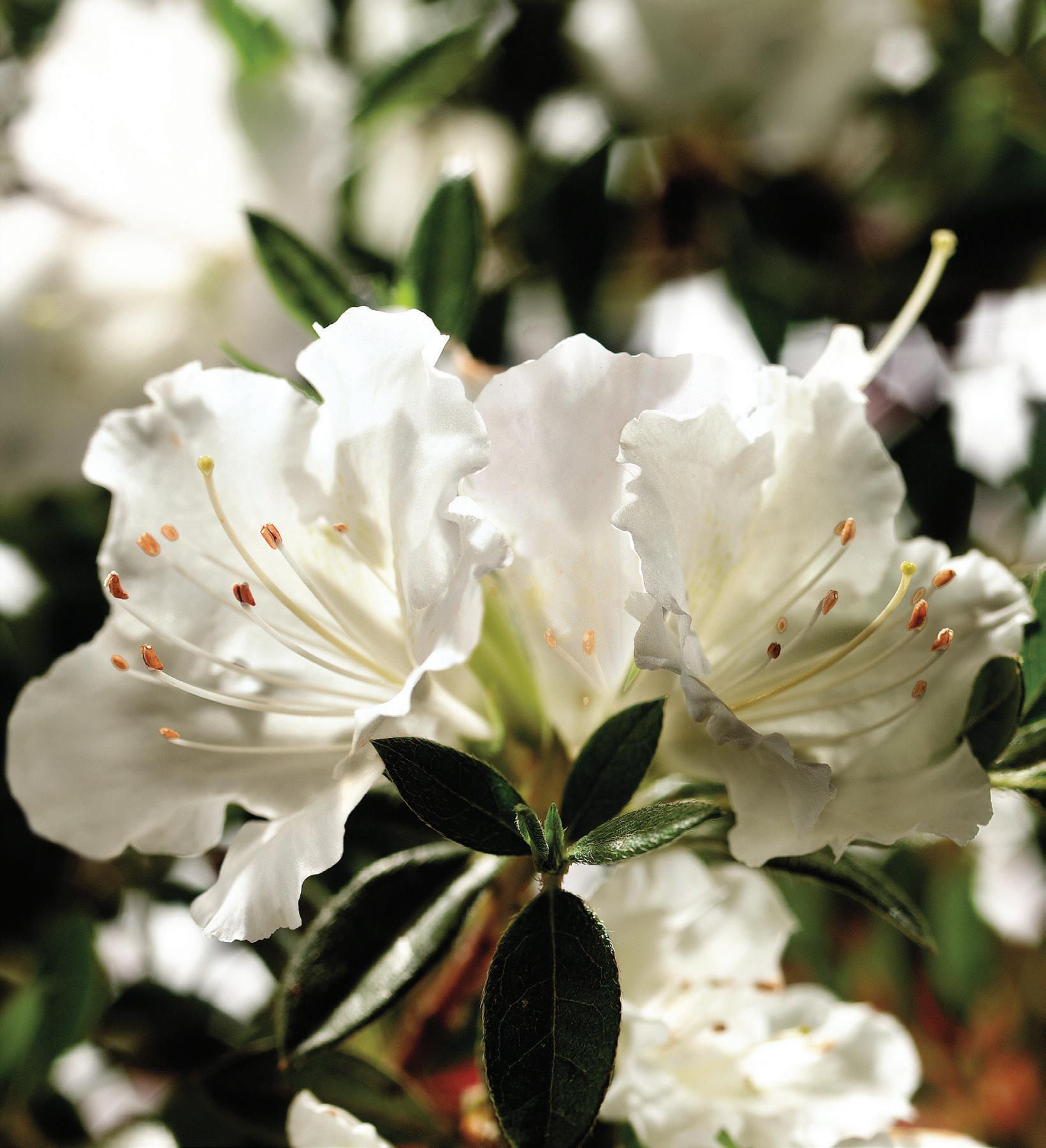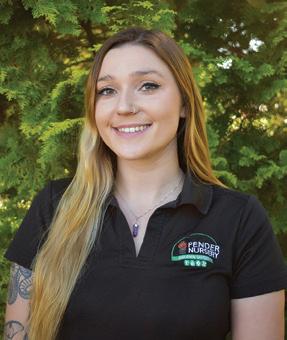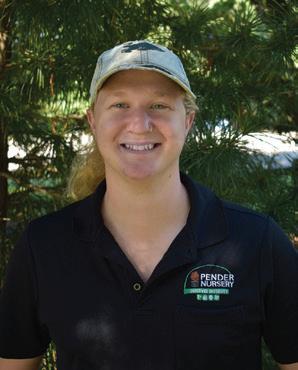








Piedmont
Bobcat
Bobcat
Bobcat










Piedmont
Bobcat
Bobcat
Bobcat
Published by
North Carolina Nursery & Landscape Association, Inc. 968 Trinity Road, Raleigh, NC 27607
NCNLA Staff
Richard Lawhun Executive Vice President
Katie Rodrigues Director of Events & Education
Kathryn Stansbury Director of Business Development
Wendi Doak Director of Marketing & Communications
Rayna Bailey Office Manager
Nursery & Landscape Notes is published quarterly by the North Carolina Nursery & Landscape Association, Inc. (NCNLA), covering news, research, education and business in the nursery and landscape industries. The publication is distributed to approximately 825 horticulture producers, landscape professionals and industry suppliers.
Nursery & Landscape Notes is provided as a member service.
2024 NCNLA Board of Directors
Officers
Ariel Montanez
President
Pender Nursery Garner, NC
Dana Massey
Vice President, Secretary/Treasurer
Plantworks Nursery Rougemont, NC
Tim Johnson, II
Past President
Tim Johnson
Landscaping Statesville, NC
Directors
Hunter Casey
Casey Nursery Inc. Goldsboro, NC
Michael Gossett
Gossett’s Landscape
Nursery Inc. High Point, NC
Todd Lange
Gregory Poole Equipment Company
Raleigh, NC
Jonathan Schwarz Pender Pines Garden Center Hampstead, NC
Ed Snyder Greenleaf Services Linville, NC
Jason Tebben
Savatree/ Arborscapes Pineville, NC
Educational Advisors
Jason Davis University of Mount Olive Mount Olive, NC
Caleb Fox
Alamance Community College Graham, NC
Jodi Songer NC State University Raleigh, NC
Advertising
For advertising inquiries and publication schedule, please contact Wendi Doak at wdoak@ncnla.com or 919-819-9119, ext. 1002.
The inclusion of products or brand names in this publication is not an endorsement by the North Carolina Nursery & Landscape Association.
Mission: To provide essential value to our members through education, marketing and advocacy.
Vision: To promote and protect the interests of North Carolina’s green industry.
Connect with NCNLA
facebook.com/NCNurseryandLandscapeAssociation
twitter.com/tweet_ncnla
instagram.com/ncnla ncnla.com | BuyNCPlants.com | GreenandGrowin.com
Tax Deductible Dues Contributions or gifts to NCNLA are not tax deductible as charitable contributions. However, they may be tax deductible as ordinary business expenses. A portion of your dues is not deductible as an ordinary business expense to the extent that NCNLA engages in lobbying. The estimated non-deductible portion of your dues assessment is 20%.
Certified Plant Professional Exam
March 22, 2024
Wilson, NC
www.ncnla.com/CPP
Summer Educational Summit
June 20, 2024 NCSU McKimmon Center Raleigh, NC www.ncnla.com
Robert Cagle Memorial Golf Tournament
June 21, 2024
Lochmere Golf Club Cary, NC www.ncnla.com
NCNLA Day at Caterpillar
August — Date TBD Clayton, NC www.ncnla.com
Green & Growin’ 25
January 13-17, 2025
Greensboro, NC
www.greenandgrowin.com
INDUSTRY EVENTS
AmericanHort Cultivate
July 13-16, 2024 Columbus, OH
www.cultivateevent.org
JoCoPlants Show
August 21, 2024
NC State Fair Grounds Raleigh, NC www.jocoplants.com
ELEVATE
November 3-6, 2024
Charlotte, NC
www.landscapeprofessionals.org/ elevate
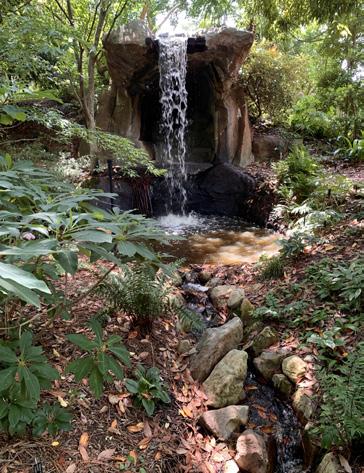
Michelle’s Garden Waterfall
See article on page 38.
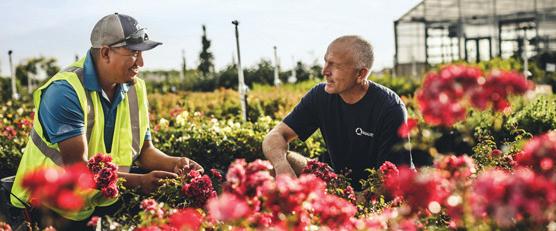


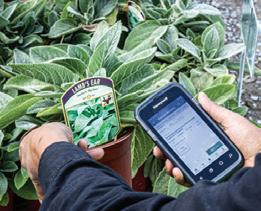

As we near the end of the winter season, Green & Growin’ 24 has come and gone. My term as president of the association also came to an end recently, when I passed the gavel to Ariel Montanez at our annual meeting. Before I get into all of NCNLA’s achievements over the past year, I would like to take a moment to thank you, our members, for your participation and support. I would also like to thank my fellow board members, our committee members and the NCNLA staff for their tireless and diligent work supporting the association!
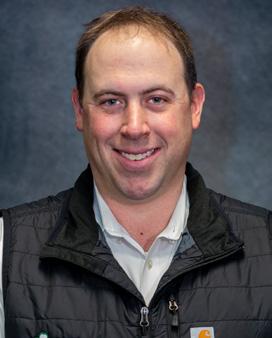
Serving on the board and as NCNLA president has been an incredible experience. When I agreed to attend the Volunteer Leadership Summit about 10 years ago, I had no idea what would be in store for me.
My goal then was the same as it is now (although my perspective has certainly developed in the meantime): I simply wanted to help an industry that welcomed me with open arms. From there I attended a second Leadership Summit and ultimately joined the board, on which I served for three years before beginning the officer track. During that time, I have learned so many things from some of the best in the business. As a landscaper, I developed relationships with nurserymen on a level I likely never would have encountered otherwise. At the same time, I was able to form relationships with landscapers who otherwise would only have been viewed as competitors. (Don’t worry, we still compete!) And during those 10 years, I have gained an understanding of the issues and challenges that affect our industry as a whole, as well as a lifetime’s worth of knowledge and relationships, and I am thankful for each of you who has taken part in that journey.
Back to our annual meeting, which was the best-attended such event in my time. So much information was covered in a short time, but here are my highlights from the gathering:
• NCNLA’s relationship with educational institutions across North Carolina is stronger than ever.
• The Legislative Committee is in great hands now under the leadership of Gary Whitehurst, along with a strong and energetic new lobbyist in Anna Scott Marsh.
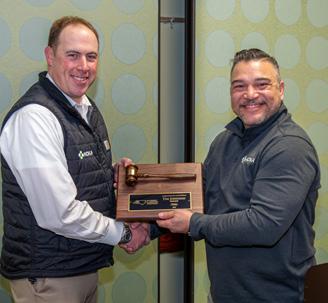
• And last, but certainly not least, as of FY23, we have fully recovered from the financial difficulties caused by the cancellation of Green and Growin’ 21.
Green & Growin’ 24 was an action-packed event, with extremely strong attendance at both the education sessions at the Sheraton and the Marketplace at the Greensboro Coliseum. Going into the event, the board set a lofty sponsorship goal, and as we have come to expect and appreciate, so many of you stepped up and helped us to surpass that goal! I want to especially thank each of our sponsors: You are a huge part of what makes this event successful, and we couldn’t do it without you.
Part of the Green and Growin’ 24 festivities included the second annual cornhole tournament and the second annual President’s Reception. The tournament raises money for the NCNLA Scholarship Fund, while the reception allows for networking, conversation and an overall good time. In addition to those events, we hosted the first annual CPP breakfast, which far exceeded our attendance expectations. We hope you will join us at these events — and more — next year at Green & Growin’ 25.
As I sign off for the final time as NCNLA president, I do so excited to see how Ariel serves our membership and takes our association to the next level. NCNLA is in great hands with Ariel at the helm, and with a strong board and staff working together to support each other and our industry as a whole.
Again, I cannot thank each of you enough for trusting me with the opportunity to serve the association. See you soon!
Hey, hey, nursery and landscape friends and family! For those of you who don’t know me, my nursery experience is not the traditional one. I am a former United States Marine with a business degree who had the great fortune to fall into this industry completely by accident. And thanks to Jim and Kathy Deal, I have had the greatest opportunity of my life to lead Pender Nursery, a company with a rich history in our field. My experience at Pender provided me with the distinct opportunity to get involved with the Johnston County Nursery Association, which, in turn, has allowed me the great honor of now serving as president of this great association.
 Ariel Montanez Pender Nursery Garner, NC
Ariel Montanez Pender Nursery Garner, NC
Each opportunity along the way has provided me with a new chance to grow and learn. And speaking of growing and learning … what a great Green & Growin’ show! I would like to acknowledge all the hard work and dedication put forth by the NCNLA staff to make Green & Growin’ 24 a success, along with all the volunteers from across North Carolina. You all give Green & Growin’ the unique character that no other show in the United States can ever have! Our industry makes significant contributions to our economy and infrastructure, and NCNLA is known throughout the country as a one of the strongest leaders in the horticulture and landscape industries.
As I begin my tenure as NCNLA president, I would like to start by outlining four primary objectives for 2024:
1. Continue growing and strengthening our legislative efforts to build a stronger voice and presence in our state and federal governing bodies.
2. Recognize, remember and memorialize our history to grow our future.
3. Enhance membership engagement within the association.
4. Reach out to landscape architects and municipalities to address plant specifications in our industry.
For those of you who don’t know me, I’m a “go big or go home” kinda guy — but I can’t do this alone, and this can’t be done by the staff and board alone. WE NEED YOU! Yes, you! I want this letter to serve as a call to action for every member of this association, and I challenge you to think about how you can help us in one or more of the highlighted four areas.
Continue growing and strengthening our legislative efforts. Under the leadership of Tim Johnson and Matt Hunter, we saw our legislative efforts skyrocket in 2023. We had a very successful and productive Legislative Day, during which we had the opportunity to meet several senators and representatives to discuss several key issues. And I want to recognize and thank Matt for his service as chair of the Legislative Committee. Had it not been for his tireless efforts, we would not have reached this point. Matt has decided to step down and pass the baton to Gary Whitehurst, and Gary has grabbed that baton and RUN with it. I am very confident that Gary will take our legislative efforts to a new level, with the help of Michael Best Strategies, our new lobbying firm.
So, what can we do to strengthen our legislative efforts? I’m glad you asked. Money. Like you, I find politics distasteful, and I am very frustrated with the political process. But the fact remains that if we don’t have a voice or seat at the table, we are just going to be at the mercy of policymakers. To be heard, we must build a war chest. Therefore, first and foremost, we need you to contribute to our political action committee. I also want to encourage you to get involved with and stay informed about NCNLA’s legislative efforts as time progresses.
Recognize, remember and memorialize our history to grow our future. I’m big on legacy and respecting tradition (I guess it’s the Marine in me), but I believe that in order to successfully navigate the future, you need to have an
understanding of and appreciation for where you started. This year I want to work with the NCNLA staff and board to find ways to acknowledge and honor the rich history of our association. As I stated before, our industry has made significant contributions to the growth and development of the state’s economy, and I am very proud to have the opportunity to be a part of carrying on that tradition. I also believe this is an imperative initiative for the next generation of nursery and landscape professionals. So, start gathering any and all pictures and stories from the past that you might have, and we’re going to find a way to showcase them.
Build stronger relationships through membership engagement. The NCNLA staff and board have had discussions during the past few meetings about getting out and visiting our membership throughout the year, and we’re going to develop a plan to do this. Of course, it’s impossible to visit and/or contact every individual member within 12 months, so this will be a work in progress, even after my term as president is over. In addition, I want to encourage the membership to reach out to NCNLA as well — and not just to complain. And if you have something to complain about, be ready to help provide a solution.
And finally, address plant specifications. This issue has plagued our industry for too long. I don’t know how, but this year we are going to figure it out! If you have any ideas or suggestions on how we can go about this, we are all ears. The biggest challenge, as I see it, is figuring out who makes or sets the specifications for municipalities, and how we can get them all in a room together, so we can have a discussion that will help all parties concerned.
In closing, I believe 2024 is going to be a solid year for our industry, both within and outside of North Carolina. We’re facing some challenges, but I know that together we can meet those challenges head-on with the talent and experience within our association. Once again, I hope this letter serves as a call to action for every NCNLA member, and I look forward to serving you as president during a wonderful 2024!


I hope everyone’s new year is off to a good start. If you were among the thousands of people who attended Green & Growin’ 24 in Greensboro a few weeks ago, you know that NCNLA’s year is off to an exceptional beginning. The education sessions were thought-provoking and well attended, the keynote speakers were fantastic, the Marketplace was jam-packed and colorful, and the camaraderie was outstanding.
 Richard “Rick” Lawhun NCNLA Executive Vice President
Richard “Rick” Lawhun NCNLA Executive Vice President
As you can imagine, it is impossible for NCNLA staff to successfully organize and deliver an event of this magnitude without the assistance of a lot of people. While I can’t list everyone in this limited space, I do want to thank our partners, speakers, volunteers, attendees, move-in/move-out crew members, board members, committee members, venue staff and everyone else who helped make Green & Growin’ 24 a success. Your contributions are very much appreciated!
As we begin the new year, I would like to highlight some past accomplishments, along with a few new initiatives for the coming year:
• Financial statement: NCNLA had a strong year financially in FY23. Total bank accounts grew from $996,435 in FY22 to $1,204,611 in FY23 — an increase of $208,176. The association ended the year with a surplus of $92,308, and when unrealized gains associated with long-term investments are considered, the surplus increases to $118,312.
• Membership: Membership renewal is being transitioned from an anniversary date (e.g., if you joined in June, you renew in June, etc.) to a uniform calendar date. Going forward, each year all members will renew on October 1, which coincides with the start of our fiscal year. This change will help ensure that our membership records are up to date when it is time to register for the education program or purchase an exhibit booth at future Green & Growin’
shows. Thus far, about half of the NCNLA membership has been transitioned to an October 1 renewal.
• Certified Plant Professional Breakfast: This inaugural event was held at Green & Growin’ 24 for attendees who hold the CPP designation. Nearly 50 individuals attended the Wednesday morning breakfast, which will become an annual event at future Green & Growin’ shows.
• Legislative Committee: This past year, the NCNLA Legislative Committee was re-established under the leadership of Matt Hunter of New Garden Landscaping & Nursery in Greensboro, NC. The committee was extremely active and worked to influence several pieces of legislation:
Native Plant Act: The amended bill, which passed as part of the annual budget, better defines the guidelines for requiring native plants and provides greater flexibility in complying with those guidelines.
Retaining walls: The committee worked closely with legislators to clarify language that allows landscape contractors to construct retaining walls greater than 5 feet in height.
Landscape contractor’s licensing threshold: There was a proposal to increase the threshold to $40,000, which NCNLA opposed. The committee worked with legislators to maintain the current threshold of $30,000.
Economic impact study: The committee promoted the need to conduct an economic impact study of the green industry, as the most recent study is 20 years old. Legislators allocated $344,000 to North Carolina State University to conduct the study. This year, the committee is under the leadership of Gary Whitehurst of Worthington
Farms in Greenville, NC. In addition, the committee recently partnered with Anna Scott Marsh and Lane Hickman of Michael Best Strategies to provide lobbying and fundraising services.
• Political Action Committee: NCNLA is forming a Political Action Committee (PAC) to support political candidates at the state level who share our policy goals and understand the importance of maintaining a positive legislative environment for the nursery and landscape industry. The process has taken much longer than anticipated, as we are still awaiting final approval from the Internal Revenue Service. If you have already contributed to the PAC, thank you — we appreciate your support. If you made a pledge to contribute, you will be invoiced once the final paperwork is approved.
• Summer Educational Summit: For the past two years, the Summer Educational Summit, a one-day event offering seven continuing education sessions for licensed landscape contractors, has been held in June at the McKimmon Center. This coming June, NCNLA is partnering with North Carolina State University to offer a second track that addresses vascular wilt disease. This is the first time we have partnered with NC State on an event of this type, and we are excited about the topic and the partnership.
This year promises to be a busy one for NCNLA! In closing, I would like to let everyone know that Green & Growin’ 25 is scheduled for January 13-17, so be certain to block out those dates on your calendar and join us in Greensboro, NC. Until then, stay well and stay passionate about the industry you love!
Power Planter Inc. Loda, IL
Phoenix of Anderson Williamston, SC
Quality Equipment
Fuquay-Varina, NC
Izel Plants LLC Washington, DC
RediRoot Boring, OR
Mountain Meadows Nursery Weaverville, NC
Marcus Cook Farms Gray Court, SC
Dig Plant Co. Greeleyville, SC
Holly Branch Nursery LLC Spring Hope, NC
Sink Farm Equipment Lexington, NC
Ramblin Jackson Lyons, CO
Haston Farm Nursery McMinnville, TN
Healy Horticulture LLC Florence, SC
Cape Fear Lawn Masters Wilmington, NC
Ideal Landscaping & Irrigation Oak Ridge, NC
Chamberlain Landscaping & Lawn Care Clemmons, NC
Gardenology Inc. Asheville, NC
Leapfrog Landcare Cary, NC
Gwaltney Landscaping Taylorsville, NC
Irrigation and Lighting Management Charlotte, NC
Myron Greer Garden Design LLC Charlotte, NC
Raven Invasive Plant Management Asheville, NC
Shurburtt Landscape Group Inc. Spartanburg, SC
Fields Landscaping Co Inc. Greensboro, NC
Brad Caudle
Town of Matthews Matthews, NC
Claire Bunes
Town of Matthews Matthews, NC
Wendy Williams Elon University Elon, NC
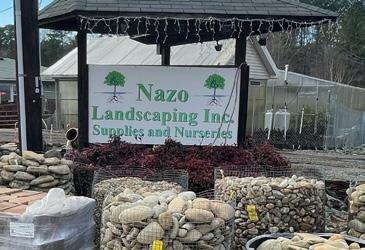
How did you get into the business?
Nazo Landscaping, Inc.
5211 Old Autumnwood Dr. Durham, NC 27705
President Philip Nazo
In business
Since 1994
NCNLA member Since 2023
Number of employees 7
Favorite offerings from NCNLA Education, networking and marketing
I always had a passion for beautifying landscapes. After immigrating to the United States from Iraq in 1994 with my family and a bachelor’s degree in agricultural engineering, I was eager to provide a better life for my family — so I hit the ground running and started a residential landscape design, install and maintenance company. On the side, I constructed a few small greenhouses in the backyard of my home and began propagating plants that I was commonly installing in my customers’ projects. Like many other businesses, when the 2008 financial crisis occurred, we took a major hit, as calls for service slowed to an all-time low. During this time, I noticed that many homeowners were no longer able to afford professional landscape services and were turning to DIY projects to cut costs. So I decided to pivot and take a huge risk by investing most
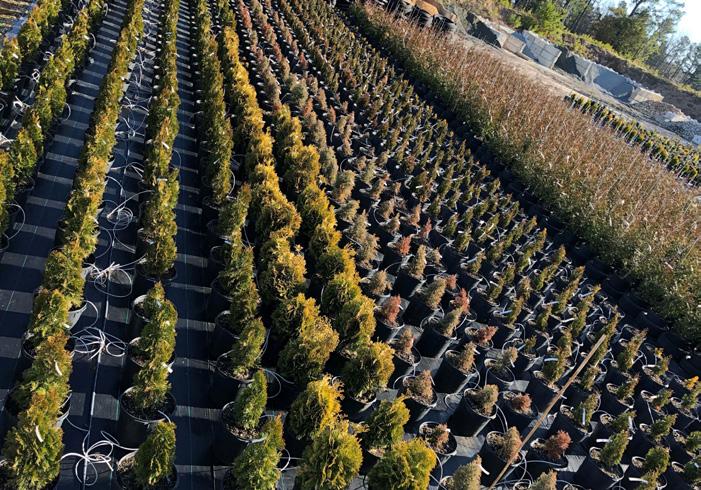
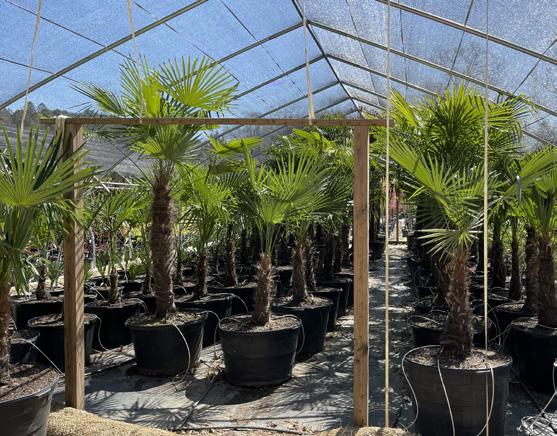
of my savings into the expansion of the operation, purchasing land and developing the business into a full horticultural nursery and one-stop landscape supply shop. I believed that by selling the same quality plants and materials I would install at my customers’ homes, I could open a whole new stream of revenue and keep the dream alive. The greenhouses in my backyard were relocated to the new land, and over the years dozens more would be built. I began sourcing natural stone from all over the world, as well as the best-quality soils, mulches and aggregates in the area. It took constant perseverance, research and years of working seven days a week to establish what Nazo Landscaping has become.
Since we essentially have two operations running at the same time, a typical day is usually hectic. Everyone meets at the nursery/shop in the mornings. The install crew will load up equipment, tools, soils, hardscape stone and plants, then head out promptly to complete commercial and residential installs. The remaining staff stays to manage the nursery and help contractors and homeowners who come in to shop. Besides selling, loading and delivering bulk materials with heavy machinery, our shop staff monitors the nursery to ensure that all irrigation systems are functional. They also look out for any concerning issues with plants, keep track of inventory and ensure that all items are stocked. Depending on time of the year, the nursery staff may also be working on propagating thousands of new plants and trees, building new greenhouses, or expanding irrigation systems. The work involves countless hours of
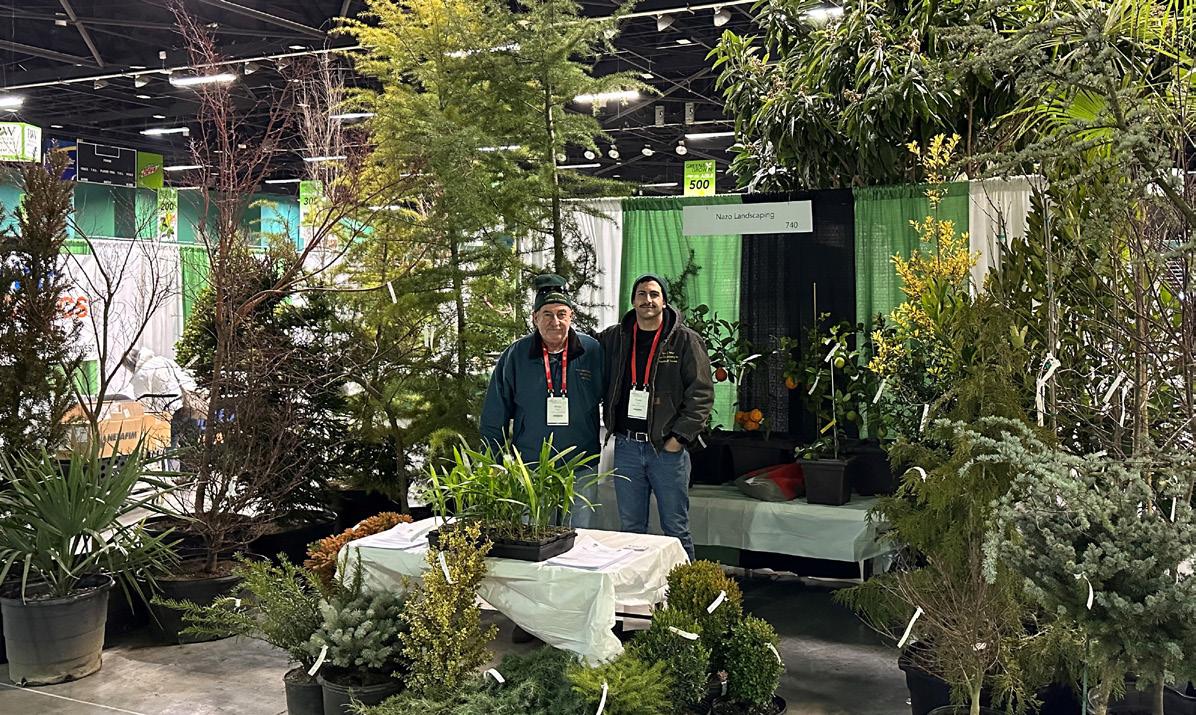
maintenance, including treating plants for pests/disease, weeding, pruning, cleaning and reorganizing greenhouses, and preparing for seasonal weather changes by winterizing irrigation systems and wrapping cold-frame greenhouses. Between ensuring install projects are being properly completed off-site and maintaining all on-site facility operations, there is never a dull moment and always something to be done.
What has been the most rewarding part of your career?
The countless number of smiles generated by highly satisfied customers over the years and the joy of running a business with family, which provides us precious time to bond. Not to mention the incredible opportunity to live the American dream. It was a dream come true to see our hard work take Nazo Landscaping from a small business (operating with just a van, trailer, mower, edger and blower) to a 60-plus-acre operation housing thousands of plants and trees, hundreds of tons of natural stone and bulk materials, and an entire fleet of vehicles and heavy machinery.
What is your company best known for?
Being a reliable one-stop shop for all landscaping materials and needs. We’re always ready to help, whether someone is just looking for guidance and top-quality materials to complete a project on their own, or if they require a very experienced and licensed professional to design and create an entirely new landscape for their home, business or commercial property.
What issues are you concerned about as a company in the green industry?
Adapting to climate change is at the top of our list. We are increasingly dealing with the challenges posed by climate change, including shifts in growing seasons, extreme weather
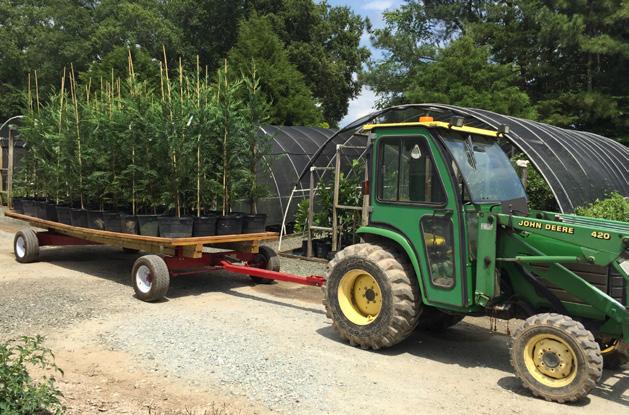
events, and new pest and disease patterns. Adjusting to these changes and implementing resilient practices are ongoing concerns.
What have you gained from your involvement in NCNLA?
The opportunity to network with so many amazing companies and growers in our industry, as well as the ability to exchange knowledge and experienced information with others who share the same passion for creating beautiful plants and landscapes.
What advice do you have for someone interested in or just starting out in the industry?
Start small and always be open to continual education. We’ve been growing our operation for decades, and I still learn something new every day! Don’t be afraid to network with others in the industry to exchange ideas and learn new methods. Carefully select an inventory of plants that cater to your target market and local climate. Invest in equipment to make your business more efficient, and always be prepared to adapt to changing market trends.
Officers
President
Ariel Montanez Pender Nursery Garner, NC
Dana Massey Vice President/ Secretary/Treasurer Plantworks Nursery Rougemont, NC
Tim Johnson II Past President Tim Johnson Landscaping Statesville, NC
Directors
Hunter Casey Casey Nursery Inc. Goldsboro, NC
Michael Gossett
Gossett’s Landscape Nursery Inc. High Point, NC
Todd Lange
Gregory Poole Equipment Company Raleigh, NC
Jonathan Schwarz Pender Pines Garden Center Hampstead, NC
Ed Snyder Greenleaf Services Linville, NC
Jason Tebben
SavATree/Arborscapes Pineville, NC
Educational Advisors
Jason Davis
University of Mount Olive Mount Olive, NC
Caleb Fox
Alamance Community College Graham, NC
Jodi Songer
NC State University Raleigh, NC
NCNLA welcomed four new members and announced two new officers for the 2024 board of directors during the annual meeting held at Green & Growin’ 24 on January 18, 2024.
Two current board members were promoted to new positions. Ariel Montanez was elected president, and Dana Massey was elected vice president, secretary and treasurer. Tim Johnson moved into the role of past president.
Ariel has been the general manager of Pender Nursery since July 2013. Born in Puerto Rico and raised in Germany, he served eight years in the United States Marine Corps before entering the green industry. He holds a business degree from Campbell University and previously served as president of the Johnston County Nursery Association.
Dana is currently president of Plantworks Nursery, a wholesale grower in Rougemont, NC. She graduated from North Carolina State University in 2011 with a major in horticulture and a minor in agriculture business management. Upon graduation, she began her career at Plantworks as the head annual grower and took ownership of the company in 2017. She is a 2015 GrowerTalks Young Grower of the Year finalist, a 2016 graduate of the North Carolina Tobacco Trust Fund Agricultural Leadership Development Program, a 2018 Greenhouse Product News Class of 40 Under 40 winner, a 2018 NC State College of Agricultural and Life Sciences Outstanding Young Alumnus, a 2020 graduate of the Executive Academy for Growth and Leadership from Texas A&M University, and a 2020 North Carolina Nursery and Landscape Bill Wilder Outstanding Young Professional. Dana has served on the NCNLA Board since 2021.
In addition to the newly elected officers, four new members have joined the board in different capacities.
Hunter Casey will serve a one-year term on the board, finishing out Dana Massey’s three-year term. He received a bachelor’s degree in horticulture science from NC State in 2020 and is currently vice president of Casey Nursery Inc. in Goldsboro, NC, representing the fourth generation of his family to enter the nursery business.
Todd Lange, who currently holds the positions of sales manager and operations manager at Gregory Poole Equipment Company, will serve a three-year term on the board. Prior to joining Gregory Poole, Todd worked at Caterpillar for 23 years. He began his career at Caterpillar’s Sanford, NC, facility and later held various dealer-facing roles in Illinois, Minnesota, Texas and the United Kingdom. He then served as global commercial
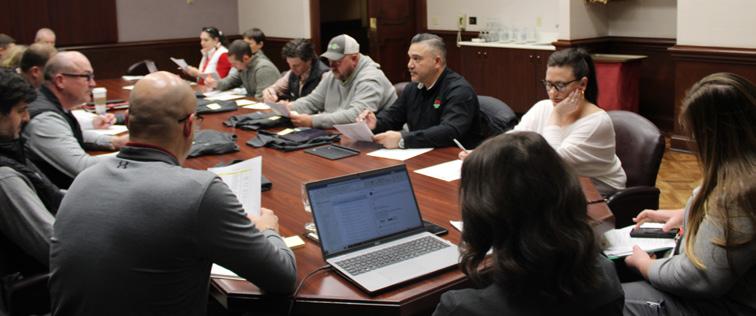
manager for Cat Backhoe Loaders in Cary, NC, before assuming his current role with Gregory Poole at the Raleigh branch in 2022. Todd hails from Ohio, where he graduated from Otterbein College in 1998 with a bachelor’s degree in marketing and finance.
Jason Tebben will also serve a three-year term on the board. He and his business partner, Nathan Morrison, started Arborscapes in July 2000, offering high-end residential landscaping, maintenance, tree care and plant health care. Recently, they partnered with SavATree to grow the company’s presence in the Carolinas. Jason received a bachelor’s degree in landscape horticulture from The Ohio State University in 1998.
Jason Davis joined the board as an educational advisor. Jason is the assistant dean of the School of Agriculture & Biological Sciences at the University of Mount Olive, currently in his fifth year. He is also a vegetable farmer and grower, with previous experience as an agricultural teacher and state FFA executive secretary. Jason earned his Associate of Arts degree from Sampson Community College in 1996, his Bachelor of Science degree in agricultural education from NC State in 1998, his Master of Science degree in agricultural education from NC State in 2003, and his Doctorate degree in agricultural education from NC State in 2017.
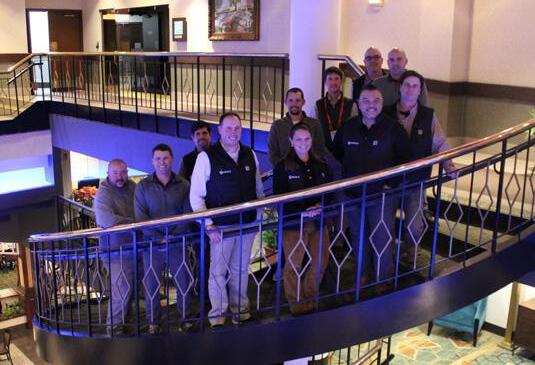
Caleb Fox also joined the board as an educational advisor. He has served as lead instructor for the Horticulture Technology Program at Alamance Community College (ACC) since August 2023. Prior to that time, he was lab manager for the ACC Horticulture Technology Program for nearly three years. Caleb holds an Associate of Applied Science degree in horticulture technology from ACC and obtained his bachelor of science degree from North Carolina A&T University. As an instructor at ACC, he is dedicated to helping students succeed both before and after graduation. He is also the co-advisor for the FLORA Club and the Horticulture National Collegiate Landscape Competition Team. Prior to coming to ACC, he worked in the industry as a landscaper and a horticulturalist.
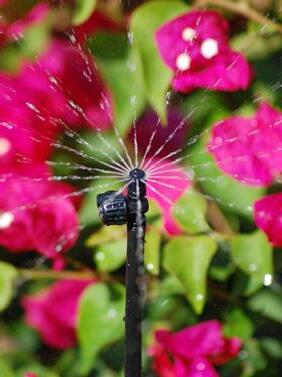


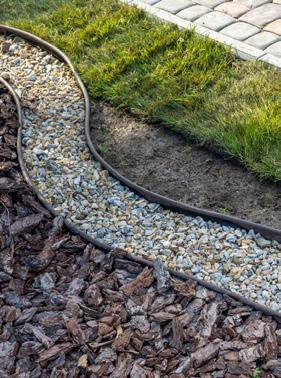

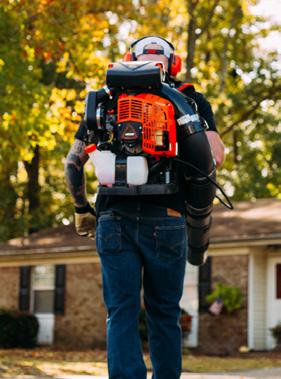
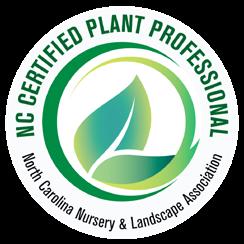
On January 16, during Green & Growin’, 33 individuals sat for the Certified Plant Professional (CPP) exam at the Sheraton Greensboro at Four Seasons. Congratulations to the following individuals who earned their CPP designations:
Gail Byrd, LKN Landscape Design
Brad Caudle, Town of Matthews
Charlie Cheema, Elon University
Joseph Davenport, North Carolina Department of Agriculture and Consumer Services (NCDA&CS)
Lisa Hofbauer, SiteOne Landscape Supply
Sebastian Kimlinger, Carol Woods Retirement Community
Sharon Licata, Bland Landscaping Co. Inc.
Celene Locke, Wrightsville Beach Landscaping & Lawn Care Inc.
NCNLA would also like to recognize the CPPs who have renewed their designations for 2024-2026. These individuals have committed to their professional growth, and we look forward to seeing them continue to stand out within the industry. If you’re not sure when your CPP designation is up for renewal, please email education@ncnla.com.
Lindsay Adams, Hughes and Hughes Nursery Inc.
Paul Adams, NCDA&CS
Max Alff
Andrew Allen, NCDA&CS
Steve Ayres, The Biltmore Company
Adam Banks, Autrey Tree & Landscaping Co. Inc.
April Bauder, NCDA&CS
Eric Bell, Pike Nurseries
Timothy Boone, Snow Creek Landscaping
Katie Bradley, The North Carolina Arboretum
Gregory Bugica, City of Charlotte
Brodie Butler, City of Charlotte
Julia Canipelli, Pike Nurseries
Thomas Cannady, NCDA&CS
Kevin Cassel, North Carolina Cooperative Extension
Jordana Chalnick, The Biltmore Company
Katie Coleman, Green View Corporation Inc.
Shelley Cook, Carolina Garden Company
Amanda Cook, NCDA&CS
Claire Craven, Logan Trading Company
Elisabeth Davis, Pike Nurseries
Chuck McCurdy, SiteOne Landscape Supply
Seth Overman, Bland Landscaping Co. Inc.
Holly Padgett, SiteOne Landscape Supply
Joshua Sipe, SiteOne Landscape Supply
Alicia Smith, City of Raleigh
Tyler Walker, The Biltmore Company
Emily Watanabe, SiteOne Landscape Supply
Greg Waters, The Biltmore Company

Jason Davis, University of Mount Olive
Jamie Deese, City of Charlotte
Sarina Dellinger, City of Salisbury
Susan Dial, NCDA&CS
Brooke Doty, The Biltmore Company
Jarred Driscoll, NCDA&CS
Melissa Dudley, Fair View Nursery Inc.
Bret Duncan, Bret C Duncan Gardening Services
Glenn Edwards, The Biltmore Company
Erika Emory, The Biltmore Company
Bonnie Faulkner, NCDA&CS
John Fields, Haywood Landscapes
Peter Freund, Pike Nurseries
James P Gallagher III, GroundPros
Sheldon Galloway, Garden Environments
Glenn Garris, GD Garris Lawn Care LLC
Joy Goforth, NCDA&CS
Colby Griffin, North Carolina Cooperative Extension
Dustin Hafer, The Biltmore Company
Maureen Hammond, Plant Lane Farm
William Handley, WAC Corporation of Greenville
Donna Harbolt
Timothy Hartley, NCDA&CS
Elizabeth Hathcock, SiteOne Landscape Supply
Ginger Hemmings, NCDA&CS
Leslie Herndon, Greenscape Inc.
Leann Hibbs
Christopher Hicks, Lakewood High School
Alex Howe, Landwork Landscapes
Hays Johnson, TerraFina Landworks LLC
Kevin King, New Garden Landscaping & Nursery
Heather Kiser, Metrolina Greenhouses
Robert Kuetemeyer, The Biltmore Company
Cyndi Lauderdale, North Carolina Cooperative Extension
Danny Lauderdale, North Carolina Cooperative Extension
Adriana Marsh, Pike Nurseries
Sam Marshall, North Carolina Cooperative Extension
Carley McCready Bingham, Cicada Design LLC
Scott Myatt, Myatt Landscaping Concepts Inc.
Lisa Marie Paione, Pike Nurseries
David Pearce, NCDA&CS
Gregory Pierce, Pike Nurseries
Jessica Piercy, The Biltmore Company
Trey Plunket, Pike Nurseries
Laura Preston, Redmill Landscape & Nursery Inc.
CD Prillaman, Prillaman Landscape Dimensions Inc.
Thomas Pruett, Evergreen Classics LLC
Patricia Pruitt, Pike Nurseries
Bill Quade, The Biltmore Company
Elizabeth Riley, Alamance Community College
Freda Rosen, Red Clay Garden Designs
Tom Ross, High Country Nursery
Cliff Ruth, Blue Ridge Community College
Ben Saconn, Carolina Meadows
Richard Saunders, Green View Corporation Inc.
Ryan Saunders, Green View Corporation Inc.
Jen Schilkowski, Carol Woods Retirement Community
Rachel Sexton, The Biltmore Company
Mary Shearer, Pike Nurseries
Andrew Sileo, ABM Industries
James Sledge, City of Rocky Mount
Justin Snyder, Alamance Community College
Jodi Songer, North Carolina State Universty
Suzanne Stallings, The Plant Park
Jessica Strickland, North Carolina Cooperative Extension
Cort Tangeman, Just My Style Landscapes
Chad Taylor, NCDA&CS
Donna Thomas, The Biltmore Company
Sean Tonkin, Wrightsville Beach Landscaping & Lawn Care Inc.
Paige Van Mersbergen, Trademark Homescapes Inc.
Natasha Warren, City of Charlotte
Stacy Weir, The Biltmore Company
Mike Westendorf, Carol Woods Retirement Community
Mark Wise, Landscape Contractor
Paul Young Jr., Greene Central High School
Upcoming CPP Exam: March 22, 2024 • Wilson, NC
For more information about the CPP program, to renew your CPP certification or to register for an upcoming exam, visit www.NCNLA.com or email education@ncnla.com.
Perry Jordan, owner of Arbor Landscape and Irrigation, NCNLA member and industry award winner, passed away on February 3, 2024. Perry was born in Benton County, Arkansas, on November 17, 1985, to Richard Jordan and Susan Slifer Jordan.
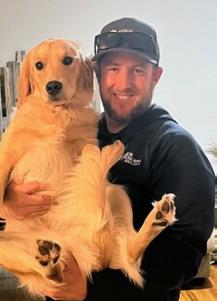
In 2021, Perry founded Arbor Landscape and Irrigation after a long professional journey with Arbor Enterprises. He began working there as a maintenance supervisor in 2010, created and managed its irrigation division beginning in 2013, was promoted to general manager in 2018, and then purchased the company in December 2020 — renaming it Arbor Landscape and Irrigation.


Gary Whitehurst, Chair Worthington Farms Greenville, NC
The Native Plants Act has been a hot topic in the green industry for some time. Over the past several months, the NCNLA Legislative Committee has worked diligently to lessen the impact of the legislation on the industry. Below is some key information about the bill, which becomes effective December 31, 2024, and applies to any contract executed on or after that date.
The Native Plants Act requires the use of plants and seeds native to the Southeastern United States, with a preference for plants native to North Carolina, in state parks and highways. Sen. Bill Rabon (R-Brunswick) was the primary sponsor. Co-sponsors were Sens. Adcock, Alexander, Chaudhuri, Hise, Jarvis, Krawiec, Lee, Lowe, Marcus, Moffitt, B. Newton, Salvador, Sawrey, Settle, Smith and Waddell.
The legislation was filed and referred to the Senate Transportation and Senate Rules committees on March 15, 2023. Changes made while in the Senate Transportation Committee were approved by both committees. The bill was heard on the Senate floor and received a unanimous vote on May 3, 2023. It was then referred to the House Rules Committee.
Analysis of the Proposed Committee Substitute (Changes Made in Senate Transportation on April 26, 2023) SB 318 would amend the current statute (Article 2 of Chapter 143B) to read:
The Department of Natural and Cultural Resources shall consult with the university system and community college horticulture programs and the North Carolina Forestry Association, to require the use of seeds and plants that the U.S. Department of Agriculture has classified as native to a state or county in the United States (including cultivars and varieties that were not bred to have reduced
If
reproductive structures). There should be a strong preference for plants that the U.S. Department of Agriculture has classified as native to North Carolina, on all lands that are part of the State Parks System, which are laid out in General Statute 143B-135.44. The states that compose the Southeastern United States are Alabama, Georgia, North Carolina, South Carolina, Tennessee, Virginia, and the following counties in Florida: Bay, Calhoun, Escambia, Gulf, Holmes, Jackson, Okaloosa, Santa Rosa, Walton, and Washington. There are two categories of seeds and plants that are exempt from this requirement. They are 1) nonnative seeds and plants used in landscaping for locations where the primary purpose is crop cultivation, crop and horticulture research, science, botanical gardens, plantings for wildlife by the Wildlife Resources Commission and zoos, and 2) nonnative turf grass.
The Department of Natural and Cultural Resources shall consult with the university system and community college horticulture programs and the North Carolina Forestry Association to require the use of seeds and plants that the U.S. Department of Agriculture has classified as native to a state or county in the United States (including cultivars and varieties that were not bred to have reduced reproductive structures). There should be a strong preference for plants that the U.S. Department of Agriculture has classified as native to North Carolina, in the highway right-of-way in the promotion of erosion control, landscaping, and general protection of the highways, except that the Department may use 1) nonnative grasses, plants, and seeds for the purpose of soil and slope stabilization for erosion control, and 2) nonnative turf grasses. Again, the states that compose the Southeastern United States are Alabama, Georgia, North Carolina, South Carolina, Tennessee, Virginia, and the following counties in Florida: Bay, Calhoun, Escambia, Gulf, Holmes, Jackson, Okaloosa, Santa Rosa, Walton, and Washington.
The Department of Transportation shall have the power to acquire by gift or otherwise land for and to construct, operate, and
Jim Freeman
Freeman Landscape Wilmington, NC
Debbie Hamrick
North Carolina Farm Bureau Raleigh, NC
Tim Johnson
Tim Johnson Landscaping Statesville, NC
Ariel Montanez
Pender Nursery Garner, NC
Nate Negrin
SouthernEEZ Landscaping Charlotte, NC
James Powers Beauty Lawn Inc. and Lawn Scenarios Cary, NC
Ed Snyder Greenleaf Services Linville, NC
Mark Yelanich Metrolina Greenhouses Huntersville, NC
Mark Metzler Jericho Farms Pikeville, NC
Mitch Smith
Smith’s Nursery Benson, NC
Dylan Gragg North 40 Nursery Morganton, NC
Dana Massey Plantworks Nursery Rougemont, NC
Anna Scott Marsh, Lobbyist
Michael Best Strategies Raleigh, NC
Lane Hickman
Michael Best Strategies Raleigh, NC
Kathryn Stansbury, Staff Liaison
NCNLA Raleigh, NC
Rick Lawhun, Ad Hoc Member
NCNLA Raleigh, NC
maintain roadside parks, picnic areas, picnic tables, scenic overlooks, and other appropriate turnouts for the safety and convenience of highway users; and the Department of Transportation may cooperate with municipal or county authorities, federal agencies, civic bodies, and the individuals to further these objectives. None of the roadside parks, picnic areas, picnic tables, scenic overlooks, or other turnouts, or any part of the highway right-ofway shall be used for commercial purposes, except for the following:
1. Materials displayed in welcome centers corresponding to General Statute 136-89.56.
2. Vending machines permitted by the Department of Transportation and placed by the Division of Services for the Blind of the Department of Health and Human Services, as the state licensing agency identified following Section 2(a) (5) of the Randolph Shepard Act (20 U.S.C. 107a(a)(5)). The Department of Transportation shall regulate the placing of the vending machines in highway rest areas and the articles dispensed.
3. Activities permitted by a local government following an ordinance meeting the requirements of G.S. 136-27.4.
Every other use or attempt to use any of the above-mentioned areas for commercial purposes amounts to a Class 1 misdemeanor, and each day’s use constitutes a separate offense.
This bill becomes effective December 31, 2024, and would apply to contracts entered into on or after that date.
The previous version of the bill, and the original version filed on March 15, 2023, had several differences. The first edition required the Department of Administration, in consultation with the university system, as well as community college horticulture programs and the North Carolina Forestry Association, to use seeds and plants classified as native to North Carolina, on all land owned or leased by the state or a state agency. The proposed committee substitute enacts a new general statute (GS 143B-135.59) that requires the Department of Natural and Cultural Resources, in consultation with the university system, as well as
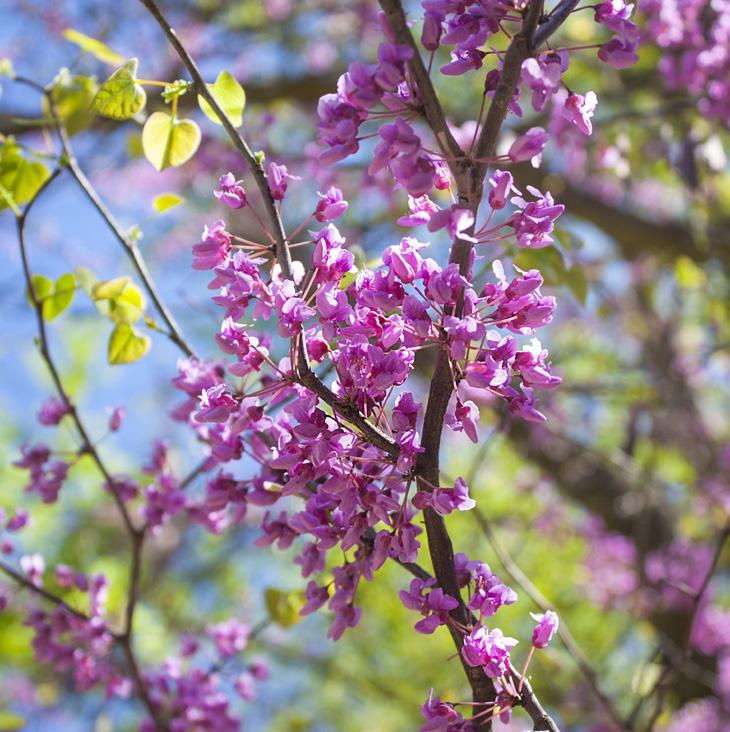
community college horticulture programs and the North Carolina Forestry Association, to use seeds and plants the U.S. Department of Agriculture (USDA) has classified as native to a state or county in the Southeastern U.S., with a strong preference for plants the USDA has classified as native to North Carolina, on all lands that are part of the state park system. As mentioned earlier, these same requirements apply to the Department of Transportation (DOT) in the highway state right-of-way but allow the DOT to use nonnative plants for soil and slope stabilization, and to use nonnative turf grass — further amending GS 139-18(9). There are two categories of plants and seeds that are exempt from the requirement of GS 143B-135.59: (1) nonnative seeds and plants used in landscaping for locations where the primary purpose is crop cultivation, crop and horticulture research, science, botanical gardens, plantings for wildlife by the Wildlife Resources Commission, and zoos, and (2) nonnative turf grass.
The Proposed Committee Substitute also deletes changes that
were proposed to amend GS 136-41.3, which required cities and towns to use seeds and plants classified as native to North Carolina when the use of Powell Bill funds includes landscaping. It also deletes the proposed changes to GS 143B-135.56 that required the North Carolina Parks and Recreation Authority to require projects awarded matching funds from the Parks and Recreation Trust Fund for local park and recreation purposes to use seeds and plants native to North Carolina.
The long title in the first edition was “an act to require the use of native North Carolina plants and seeds on state property and highways and on local projects that use state funds for landscaping.” In the Proposed Committee Substitute and current edition of the bill, the long title was changed to “an act to require the use of plants and seeds native to the Southeastern United States, with a strong preference for plants native to North Carolina, in state parks and on state highways.” The current edition of the bill can be viewed at https:// www.ncleg.gov/Sessions/2023/Bills/Senate/ PDF/S318v2.pdf.
The NCNLA Political Action Committee (PAC) represents the interests of the nursery and landscape industry at the state capitol in Raleigh, NC.
Complete and return this form with payment. Contributions are for the 2024 calendar year. Contributions must be made by personal check (no company checks), personal credit card or personal bank draft. PAC funds are used to support candidates for state elective office who share NCNLA’s policy goals and understand the importance of maintaining a positive legislative environment for the green industry. Thank you for your contribution!
Legacy Society Annually ($6,400)
Advocate Club Annually ($500)
Capitol Society Annually ($4,500)
Bicentennial Club Annually ($200)
President’s Circle Annually ($2,500)
Century Club Annually ($100)
Champion’s Circle Annually ($1,000)
Other $
My payment is by:
Personal check (payable to “NCNLA-PAC”) Amount: $
Personal credit card/bank draft Amount: $
Please provide the following information:
Name:
Email:
Address: City, State Zip:
Employer/Company Name:
Phone:
Job Title:
All contributions must be from a personal account. We cannot accept company/corporate checks or credit cards. If you are contributing using your credit card or bank draft, you will be invoiced electronically at the email address you provided. If contributing by check, please make personal checks payable to NCNLA-PAC and mail to: NCNLA-PAC, 968 Trinity Road, Raleigh, NC 27607. If submitting this form electronically, please email it to kstansbury@ncnla.com.
North Carolina law requires political action committees to report the name, mailing address, job title and name of employer for each individual whose contributions total in excess of $50.00 in an election (defined as the period beginning the day after the general election up to and including the primary and the period beginning the day after the primary up to and including the general election). Contributors may not give more than $6,400 per election. Contributions are not tax deductible for federal or state income tax purposes.

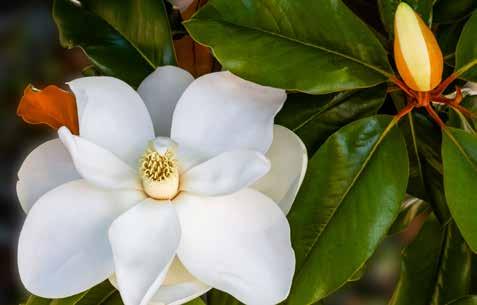

Each year, NCNLA acknowledges exceptional individuals and businesses within the state’s green industry for their notable contributions. The 2023 NCNLA Industry Award recipients were publicly announced during the NCNLA annual meeting held at Green & Growin’ on January 18, 2024.

» NCNLA Awards Committee
We extend our gratitude to the NCNLA Awards Committee members (listed below) for their dedication in meticulously evaluating award nominations and choosing the deserving 2023 recipients.
Margaret “Phil” Campbell
Kirk Davis
Tony Evans
Chad Gragg
Jeremy Shaver
Nick Waddell
Established in 1994 and named for a longtime executive director of the North Carolina Association of Nurserymen, this award recognizes qualified young men and women for outstanding service in the field of environmental horticulture and their inspiration to others starting out in the field. Caleb Gragg is the recipient of this year’s award.
★ Caleb Gragg
Why he was nominated
Caleb, who assumed the role of nursery manager at North40 Nursery in 2020, has demonstrated remarkable dedication and hard work over the years. Raised around that nursery, he has deep roots in the industry. And graduating from Western Carolina University with a degree in computer programming, he brings a unique skill set to his role. Under his leadership, North40 has experienced increased productivity and quality. Furthermore, Caleb’s active involvement in industry events like field day demonstrations, as well as his engagement with organizations like the Caldwell County Nursery Association and local youth programs, showcase his commitment to the industry and community.

The most rewarding part of this career is getting to work with my family and build something I can pass on to my kids. I have been working in the nursery since I was able to carry container plants around my dad’s farm, and I hope to be able to pass this experience along to my kids.
I would recommend having a lot of patience and not being afraid to get your hands dirty. Growing a plant, especially on our side of the nursery industry, takes time. Also, think outside the box — look at what someone else is doing and ask yourself what you can do differently or how you can do it better. And just keep going — this can be a hard industry to get into, and you’ll win some and lose some. Just keep giving it all you have, and in the end it will be very rewarding.
Established in 1972 and named for the founder of Apex Nurseries, this award recognizes outstanding contributions to the nursery industry by a candidate working directly in the nursery industry. Vaughn Willoughby is the recipient of this year’s award.
★ Vaughn Willoughby
Why he was nominated


Vaughn has acted as a dedicated mentor within the industry, serving on the Alamance Community College (ACC) Horticulture Advisory Board and playing a pivotal role in establishing an agricultural business degree program at ACC. Vaughn’s extensive contributions to the local community, including generous donations of time, plant materials and expertise, further highlight his commitment. Additionally, his involvement with the Farm Bureau underscores his advocacy for the industry. Despite reaching a stage in his life when he could easily choose to slow down, Vaughn continues to work tirelessly — not only in growing a second business, but also in consistently giving back through his time and energy.
What has been the most rewarding part of your career so far?
As a young man fresh out of North Carolina State University in 1977, I thought I knew it all. Boy, was I wrong. Even after a long career in the industry, I still learn something new every day, and most of it comes from my peers. This group of men and women includes some of the most giving and helpful people in the world who are eager to share and assist, and I would say that’s a big part of the rewarding aspect. Being able to help people who are where I once was — a young man trying to make his way and figure it out — is truly fulfilling. Being recognized by others with the D.S. Copeland Award is still hard to believe. I remember going to Apex Nurseries and seeing the plaque there with the names of the people who had won this award previously. I was in awe of those people — they were the most amazing and respected individuals in our industry. To be included in this list is an honor I don’t take lightly. I am very grateful and honored to be thought of by my colleagues in this way.
First, I believe in education. The horticultural industry is complex and far-reaching, offering unlimited opportunities for young men and women to excel — but knowledge is the great equalizer. There are great programs across this state where you can learn. Plant identification is the most valuable skill. How can anyone possibly be involved in this field without plant knowledge? It’s the one thing that separates good plant people from average plant people. There are great opportunities to work alongside people and learn from them, and that knowledge is something no one can ever take from you.
Established in 1994, this award recognizes a high level of professionalism in the management or ownership of a field or container nursery, as well as leadership in the nursery industry through participation in local, regional, state and national organizations. Brent Langston is the recipient of this year’s award.
Why he was nominated
Brent has had a remarkable 30year journey in the nursery industry. Starting as a high school student at Swift Creek Nursery, he later worked at Fowler’s Nursery until 1996, then returned in 1999 as head grower until 2007. For the past 16 years, he has led Jericho Farms as container production manager.
Jericho Farms has flourished under Brent’s leadership, now boasting more than 50 acres of container production and 150 plant varieties, ranging from one-gallon to 25-gallon pot sizes. Brent has been pivotal in maintaining quality standards and spearheading a 30% production increase.

Brent’s versatility shone in September 2022, when he seamlessly took over key accounts and trained a novice salesperson, resulting in record-breaking sales. Despite his sales success, Brent has dutifully maintained his role as production manager.
Brent’s industry involvement is extensive, having served on boards like those of the Johnston County Nurserymen and the North Carolina Nurserymen’s Association, where he has held various leadership positions. Additionally, he played a crucial role in fostering community collaboration during the development of the Johnston Community College Arboretum.
Brent’s dedication, leadership and contributions epitomize the essence of an exemplary North Carolina nurseryman.
What has been the most rewarding part of your career so far?
I look at the plants we grow like an artist looks at his artwork. Most of the plants we grow are started from small liners, and we turn them into something people are actually willing to pay money for! The most rewarding thing to me is that, over my career, people have spent millions of dollars on plants that I was in charge of producing, and those plants are now in landscapes from North Carolina to Florida, across to Texas, up to Michigan, back across to Connecticut, back down to North Carolina and all points in between.
What advice would you give to someone interested in the industry?
A. Be dependable — be where you’re supposed to be when you’re supposed to be there. Do what you say you’ll do.
Thoroughly complete the tasks you’re given, right down to
the cleanup after the task. Accomplish these things, and you will be trusted with larger responsibilities, which should come with larger pay.
B. Learn Spanish.
C. Look up: You can’t see what is happening around you with your face staring at your phone.
Established in 1999, this award recognizes an outstanding young person in the landscape business. Joseph Reynolds is the recipient of this year’s award.
★ Joseph Reynolds
Why he was nominated Joseph, owner and chief operator of Marble Botanics, is widely recognized as an important participant in the future of the green industry. He has distinguished himself among his peers and customers through his unwavering passion for plants. This passion is not merely a sentiment — it is backed by his dedication to knowledge, reliability and honesty, making him a shining example of what makes our industry great.


Joseph’s journey into horticulture began after graduating from North Carolina State University in 2016 at age 20 with a fast-tracked bachelor’s degree in business administration. Initially working at a recruiting firm, he soon realized his passion for plants and decided to pursue a career in the green industry. Joseph joined Pender Nursery in 2017 and immersed himself in horticulture and botany, concurrently starting a backyard nursery, known as Marble Botanics, on Marble Street in Raleigh.
Despite a brief stint in a sales position at a packaging company in 2019, Joseph’s passion for plants could not be contained. With a determination to fully dedicate himself to Marble Botanics, he took the bold step of leaving his job in February 2020 — armed with nothing but $2,000, a shovel and a hatchback. Though he no longer had the backyard nursery, he retained the name and committed to providing residential customers with organic, ecofriendly landscape and gardening services.
Since then, Marble Botanics has flourished under Joseph’s leadership, growing to employ seven individuals. Joseph’s commitment to innovation and education in sustainable practices remains unwavering as the company continues to deliver exceptional landscape installations and garden maintenance services. His primary mission is to enhance the health and biodiversity of the local ecosystem in the Triangle area.
What has been the most rewarding part of your career so far?
The most rewarding part of my career so far has certainly been seeing the properties on which we have completed projects flourish under our maintenance. When plants are initially placed in the ground, they are often small, sourced from the nursery. However, when planted with correct practices and the right considerations, they begin to thrive, offering both beauty and ecological support. Seeing these plants establish themselves and become our clients’ favorite aspects of where they work or live is truly priceless!
What advice would you give to someone interested in the industry?
If you are interested in horticulture and landscape contracting, I believe that a love for nature, combined with a constant pursuit of its study, should be at the foundation of everything you do. The natural world is filled with interconnections, and everything we do as humans impacts it in some way. Before you begin to learn industry-proven best practices, having a base knowledge of how local ecosystems and organism interactions work is key.
Established in 2004, this award recognizes an individual’s outstanding contribution to the association and industry — and more specifically, their involvement in program development and execution. Jason Davis is the recipient of this year’s award.
★ Jason Davis
Why he was nominated Jason has held various roles in education and administration over the past 25 years, teaching high school agriculture, coordinating the North Carolina Future Farmers of America (FFA) for nearly 15 years, and serving as assistant dean of the School of Agriculture and Biological Sciences at the University of Mount Olive (UMO). Throughout his tenure, he has worked diligently to strengthen the horticulture industry by promoting student competitions; facilitating professional development for teachers; and providing opportunities for youth to explore the green industry through conferences, camps and career shows.


Jason has also been actively involved in teaching the Certified Plant Professional course to UMO students, as well as offering courses in plant science and horticulture at the high school,

community college and university levels. Additionally, he has overseen 15 years of FFA horticulture competitions at the state level, authored articles for the NCNLA’s Nursery & Landscape Notes and conducted numerous professional development workshops on horticultural topics for high school agriculture teachers.
What has been the most rewarding part of your career so far?
Working with plants has been part of my life since I can remember. I recall having little fields in the backyard behind our barn where I grew an assortment of weeds on my “farm.” In high school, my agricultural teacher and horticultural classes fueled my passion for plants. My work in growing plants personally and at school was the easy part — plants respond quickly to light, water and fertilizer. People, on the other hand, may take years to utilize the inputs you provide them. My greatest accomplishment is that some of those seeds I planted — or helped to plant — are now bearing fruit, so to speak.
Learning resilience over the years has also been very rewarding. In high school, I wanted to grow plants! My first attempt was a cold frame and various garden vegetable transplants. A year or so later, I built my first greenhouse, out of which I sold plants and helped support myself in college. When I began teaching, I purchased a John Deere 5105 tractor to grow watermelons. Each dollar I earned was reinvested in my operation. It might look easy from a distance, but starting from zero is a slow, incremental process.
I began my educational journey after high school at Sampson Community College, transferred to North Carolina State University, worked on my master’s degree at night while teaching, and completed my doctorate while working full time as the state FFA executive secretary/FFA coordinator. Each day, I resolved to do the best I could. I became a teacher because I wanted to help people.
What advice would you give to someone interested in the industry?
I learned to emulate what I saw in other great leaders, thinkers and innovators. I would advise others to:
• Find great mentors who embody the traits they wish to have. Surround yourself with good people.
• Never quit. If you never leave, you will never lose.
• Stop by and see your parents every chance you can. They may not always be here.
Established in 1999 and named for a longtime organizer extraordinaire for the North Carolina Association of Nurserymen, this award recognizes outstanding contributions to the nursery industry by a female. Judy Mitchell is the recipient of this year’s award.
★ Judy Mitchell
Why she was nominated
Judy has more than 40 years of experience in the nursery business, and her unwavering dedication and commitment to the horticul-
tural field is evident in every aspect of her work.
From her early days on a dairy farm in Catawba County, where she assisted her grandmother in tending to flower gardens, to her collegiate education in horticulture at North Carolina State University, Judy’s passion for plants has been a lifelong journey. Her extensive experience includes pivotal roles working alongside Dr. Joe Love at the JC Raulston Arboretum and serving on the Flower Growers Board.
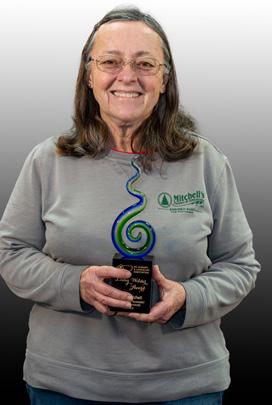
Judy’s entrepreneurial spirit shone through when she and her husband established Mitchell’s Nursery and Greenhouse in 1979. Despite facing challenges, such as her husband’s medical issues and subsequent job loss, Judy took the reins, laying the groundwork for a flourishing business. Over the years, Mitchell’s Nursery has expanded significantly, with Judy at the helm overseeing many aspects of daily operations, including customer interactions, plant orders and employee management.
Judy’s community involvement has been equally impressive. Her tireless dedication serves as an inspiration to women, and not just within the horticultural industry. From serving on the YMCA board to leading the United Methodist Women at her church, Judy embodies a spirit of service and leadership.
What has been the most rewarding part of your career so far?
The most rewarding part of my career is just watching plants grow. It is amazing to see the changes, almost daily — especially with the greenhouse crops (nursery crops grow a little slower). I especially love the “wow factor” customers report when entering the poinsettia and geranium greenhouses for the first time. Homewood Nursery in Raleigh and Mitchell’s are the only poinsettia test trial sites in North Carolina, and are among just a few across the country. In addition to the 83 varieties of poinsettias we grew in 2023, we also grow annuals, potted plants, herbs, vegetable plants, trees and shrubs — not many nurseries offer this much variety. It amazes me to see how the nursery has grown from the little corner of our yard in a subdivision to where we are now, and that we now provide all or part of the annual income for 11 families — they have become part of our family. It’s also rewarding to see employees learn and take on more responsibility. I enjoy seeing customers’ yards filled with our plants, and seeing finished landscaping projects for which we selected plants. Many customers bring in photos of their gardens to show us.
What advice would you give to someone interested in the industry?
If you think you would like to make a career of the green industry, consider trying it part time first. Most companies hire seasonal
workers, or volunteer to work during their busy season, if you can’t get hired right away. Be willing to do anything. Be flexible. If you are a good worker, they will pay you. Talk with someone in the part of the industry you’re interested in and learn more about it. Take courses in community colleges or at NC State. Above all, get experience.
Established in 1978 by Oakland Plantation, this award is given to individuals for outstanding service to the nursery and/or landscape industry. Warren McCrimmon is the recipient of this year’s award.

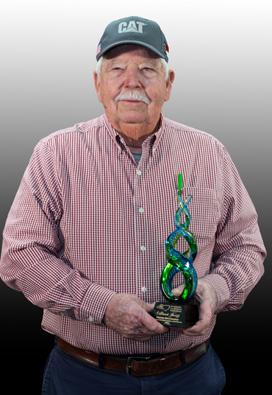
Why he was nominated Warren assumed leadership of McCrimmon Landscaping in 2020 following the passing of his son, Todd McCrimmon. Retired from Progress Energy after 43 years, Warren also ran his own landscaping business concurrently. In 2008, when his son suffered health setbacks, Warren began to manage the business singlehandedly. Despite challenges with employee retention since 2020, Warren has maintained and even expanded the company’s client base by attracting more commercial clients. Still going at it tirelessly at age 77, Warren’s work ethic is unparalleled. From his time as an Eagle Scout and troop leader to his successful career as a lineman at Progress Energy, Warren has displayed a long history of leadership and dedication. He embodies integrity, leading by example at McCrimmon, where he considers no task beneath him and consistently performs at his best.
Warren has served as a mentor to numerous young men at McCrimmon Landscaping, even prior to assuming leadership. His guidance has propelled many individuals to careers as soldiers, landscape professionals, county forest rangers and more. He consistently upholds impeccable standards of professionalism, setting a high bar for himself and the company’s employees. Although many new employees lack prior landscaping experience when coming on board, Warren’s training helps equip them for the long term, providing them with many of the skills they would need to one day run their own businesses.
What has been the most rewarding part of your career so far?
Actually, this is my second career, and the first was very different from the landscaping industry. It has been a joy for me to mentor young people beginning in the workforce. Many of these individuals
have gone on to open their own highly successful landscape and irrigation companies.
What advice would you give to someone interested in the industry?
First of all, they need to love the outdoors and not be afraid of hard work. Being honest and trustworthy is a must. Staying informed of changes in the industry by networking and taking relevant courses is essential.
This NCNLA Industry award recognizes lifetime contributions and achievements in the nursery and landscape industry.
For 2023, the NCNLA Board of Directors bestowed the title of NCNLA Honorary Member upon two individuals who tragically lost their lives far too soon.
The first recipient is Josh Sorrells of Cold Mountain Nursery in Canton, NC. A beloved husband, son, brother and uncle, Joshua passed away on December 23, 2022, at the age of 47. He left behind a legacy of love and dedication to his family and community.

Josh graduated from Pisgah High School in 1994 and North Carolina State University in 1996. He co-owned Cold Mountain Nursery in Canton with his wife, Tracey, and his parents, Steve and Phyllis. Farming was his passion, and he found joy in working on his farm and nursery alongside his loved ones.
A beloved member of his community, Josh was known for his warmth and generosity. He served as president of the Haywood County Cattleman’s Association and advocated for farmland preservation. He was also involved in emergency medical services as a first responder at the Lake Logan-Cecil Volunteer Fire Department. Additionally, he contributed to the North Carolina Flower Growers Association as a past board member.
Josh’s infectious personality endeared him to everyone he met, and his memory will be cherished by all who knew him.
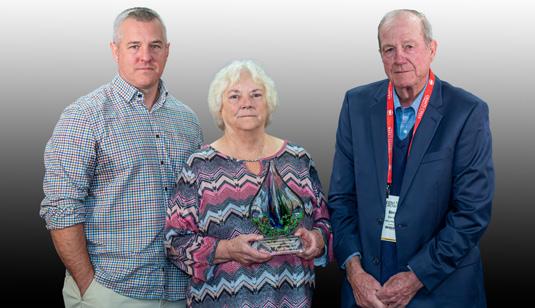
The second recipient is Steve McAllister of McAllister Greenhouses in Indian Trail, NC. A beloved husband, father, son and friend, Steve passed away on September 15, 2023, at the age of 56.
Raised in Charlotte, NC, Steve grew up immersed in outdoor activities and learned the family business at McAllister Greenhouses. He graduated from Olympic High School in 1985 and then pursued a degree in horticulture at NC State.

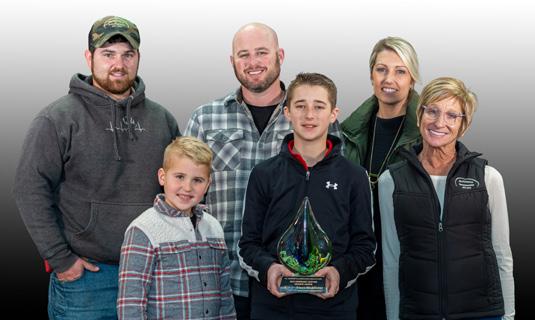
Steve McAllister’s family accepted the Lifetime Honorary Award on his behalf.
Above
his faith boldly

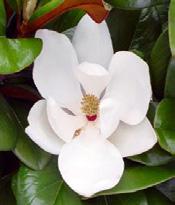

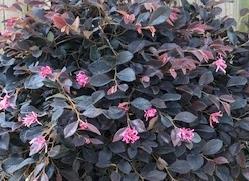
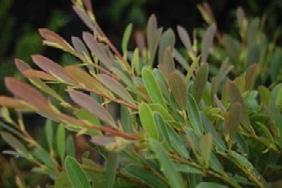

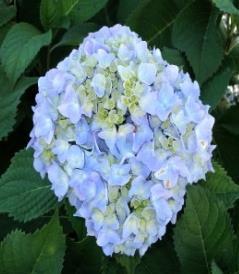
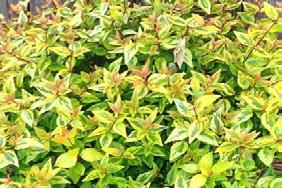
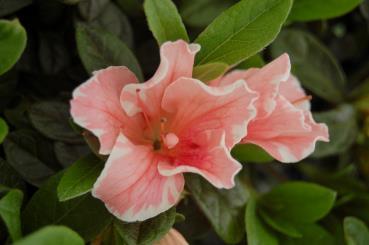
Nursery & Landscape Notes is introducing you to the next generation of green industry professionals by featuring current and recent college students with plans to pursue careers in the field.
Name: Taelor Scales
Hometown: Miami, FL
College: Pitt Community College
Graduation Date: August 2025
Major/Area of Study: Horticulture technology and turfgrass management
Horticulture-Related Places You Have Worked/ Interned: Veteran’s Base Employment Camp and Organic Garden; Pitt Community College
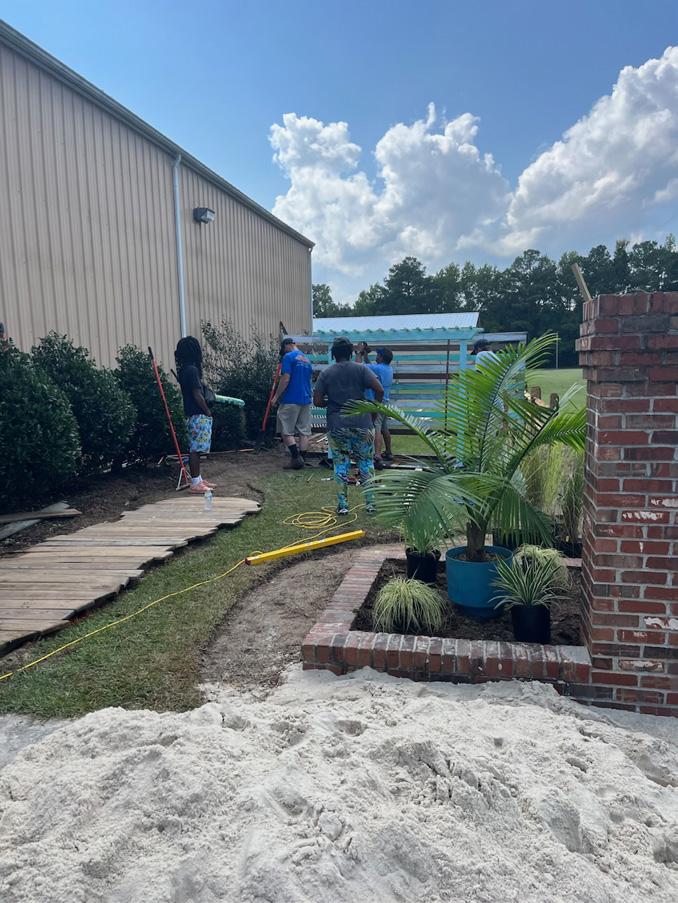

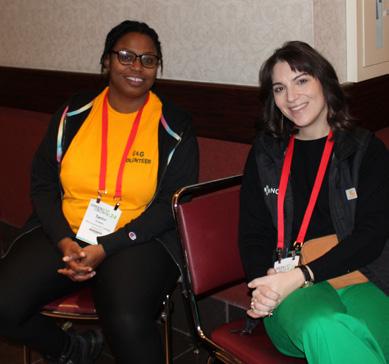
How did you discover horticulture?
I’ve always loved playing with dirt and soil. My favorite toy as a kid was a yellow Tonka dump truck. From the age of 2, I would watch my great-grandmother and grandmother working in their garden and taking care of the fruit trees in our backyard. At the time I thought they were playing in the dirt, so I wanted to play, too!
What were your most valuable experiences, either in school or from other exposure to the industry, and why?
My most valuable experiences have been working with my teachers, who took the time to help someone like me who is fairly new to the industry. The Green & Growin’ conference has also been extremely valuable. In addition, I’ve met so many wonderful people over the past two years volunteering across the globe whom I never would have met otherwise.
What were your favorite college classes, and why?
My favorites have been Soil Management and Landscape Irrigation because I believe the condition of the soil has a
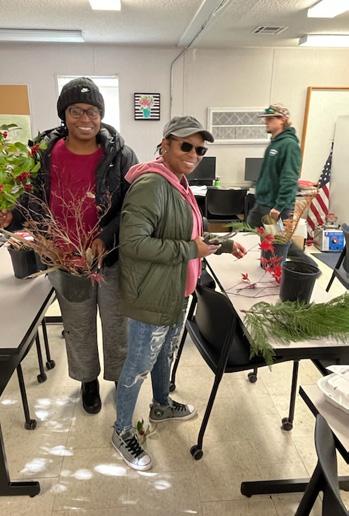
great impact on the successful growth of plants. However, I had the most fun in Landscape Construction, working together with my classmates to build a beautiful landscape structure with our own hands.
What are your plans after graduation?
I plan to work at an organic garden or landscaping company until I get my certifications in pest management and turfgrass. In a couple of years, I hope to start my own horticulture or hydroponics store to sell my own crafted soil, as well as other products.
What advice would you give to a student interested in the field?
My advice would be: (1) if you need help, ask for it; (2) get comfortable with planning ahead; and (3) there is more than one way to get a job done.
What is your favorite plant, and why? Nelumbo nucifera, which is an Indian lotus flower. I grew up on the coast of South Florida, and I’m pretty much a water
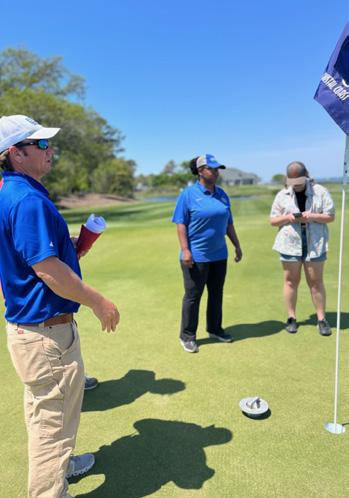
baby. I love the deep seas and watching documentaries about underwater plants and animals. This plant allows me to take a piece of home with me everywhere I go.
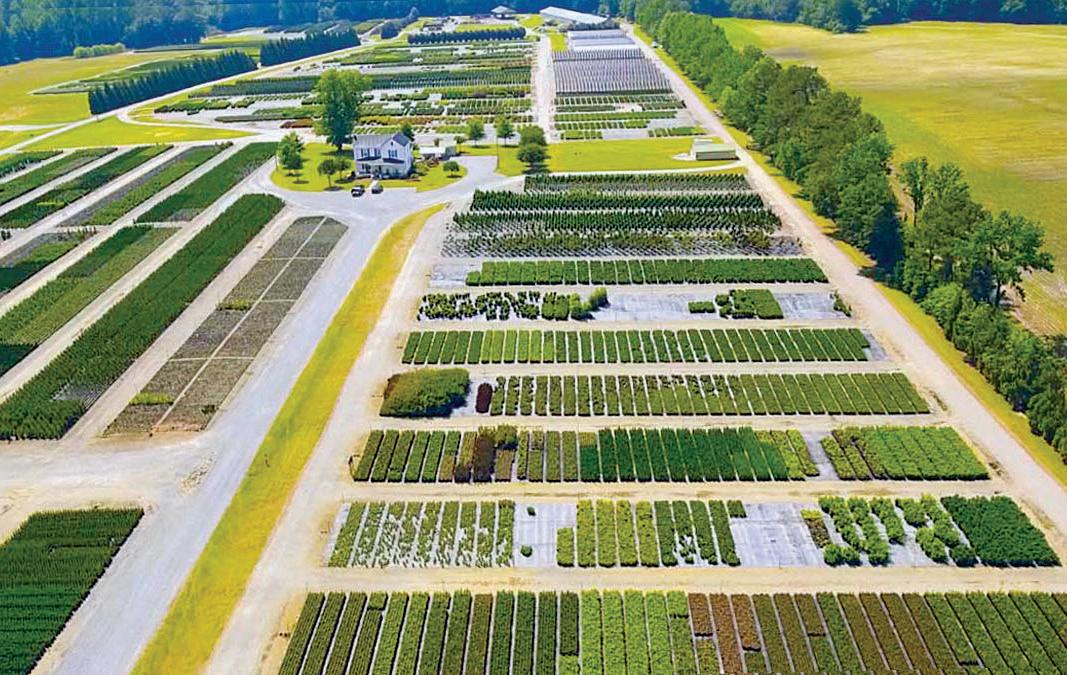

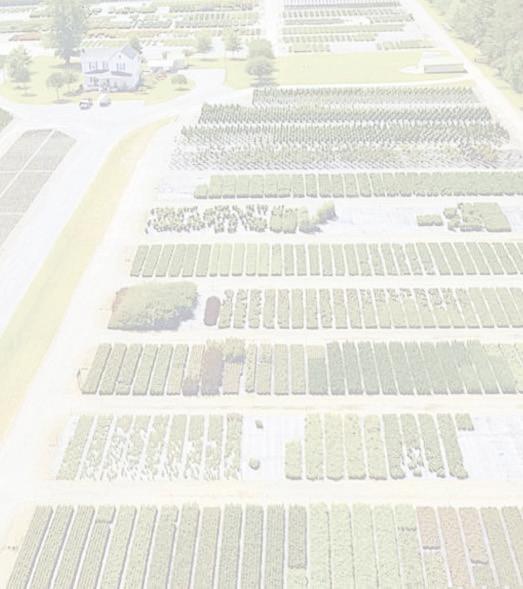
Too often, the most common perception of leadership in modern America is that of a general leading an army, an elected official giving a speech, or perhaps an impactful historical figure like Julius Caesar, Napoleon Bonaparte, George Washington, George Patten or Abraham Lincoln. The reality of leadership, however, is actually more widespread and closer to home, in that we all have a role to play on a daily basis in guiding others. Often, leadership involves an intersection of relationships, influence and simply having a vision of where a group of individuals is going and how best to get there.
Where the rubber meets the road is where you plan to use these principles in your own endeavors. For the purpose of this article, we will focus on the apprenticeship, an educational program and leadership tool that has been in existence since antiquity (Hedge & Carter, 2020). Apprenticeships are also more modernly referred to as internships, work-based learning or industry experience.
Since the early days of civilization, craftsmen and tradesmen have used apprenticeships to teach and share their trade, skill and experience (Anderson, 1907). A young person worked under the watchful eye of the master craftsman — often for years — until they had mastered the craft. Once becoming a master craftsman, it was, in turn, their responsibility to train others into the craft. Today, students in high school, community colleges and universities participate in shadowing, internships and field experiences to apply the knowledge they have learned and gain practical experience for future employment. At face value, internships
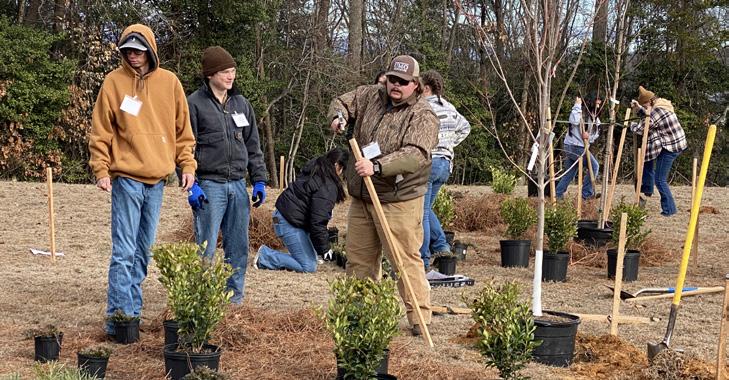
often focus on learning objectives, supervision and the number of hours worked by participants. But what if, instead, we took a deeper look at the individual and how best to develop their skills? We spend so much effort on growing plants and growing our businesses — what if we began to focus on growing people?
Even though mentoring has become somewhat of a buzzword in discussions of leadership, it is more important in our industry today than ever before. By mentoring students in an internship program, the mentor acts as a valuable resource, sharing their authentic experiences and exchanging ideas with the mentee.
Elmore (2007) suggests that quality mentorships are based on:
• Mutual trust and respect: Both mentor and mentee maintain a professional relationship.
• Authenticity: Be real. Be yourself.
• Communication: Frequent communication is key to strengthening the relationship.
• Accountability: Follow up on action items or points from previous meetings. The expression “What gets measured is what get’s done” is more than just a cliche.
Personally, I have been blessed to have many mentors in my life, and they have all served different needs (mental, spiritual, career, technical experience, etc.) I am forever thankful to each of them for sharing their experiences and guidance to help me grow as an individual and develop my career. Furthermore, they have provided me with goals and aspirations I would not have had otherwise.
Maybe you are looking for talent to add to your operation. Perhaps you are searching for an individual to pass the baton to as you look toward retirement. Whatever the reason is, utilizing a mentoring approach in internships and apprenticeships may be the tool you need to make transformative and sustainable change.
Anderson, A. F. (1907). Some Facts regarding Vocational Training among the ancient Greeks and Romans. The School Review, 20(3), 191-210. https://www.jstor.org/ stable/1077250
Hedge, J. W., & Carter, G. W. (2020). Career Pathways: From School to Retirement (1st ed., pp. 63-66). Oxford University Press.
Elmore, T. (2007). Life Giving Mentors—A Guide for Investing Your Life in Others (1st ed.). Growing Leaders, Inc.
Bland Landscaping, bustled with student energy in late January, as college students from across North Carolina joined together to learn and practice for the upcoming National Collegiate Landscape Competition (NCLC) in March. This year’s NCLC, taking place in Provo, Utah, will host more than 1,500 college competitors from around the country and feature more than 30 categories, ranging from tractor and trailer driving to plant identification.
On Friday, Jan. 26, nearly 70 students from North Carolina State University, the University of Mount Olive, Alamance Community College, and Sandhills Community College participated in a daylong event at Bland Landscaping’s Apex facility, led by Bland’s Jason Boyd. Jason worked with school professors, who also act as team coaches, to ensure that the Bland workshop provided students with the skills needed for the contest.
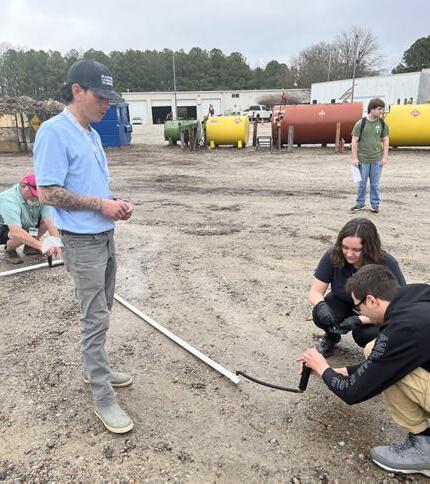
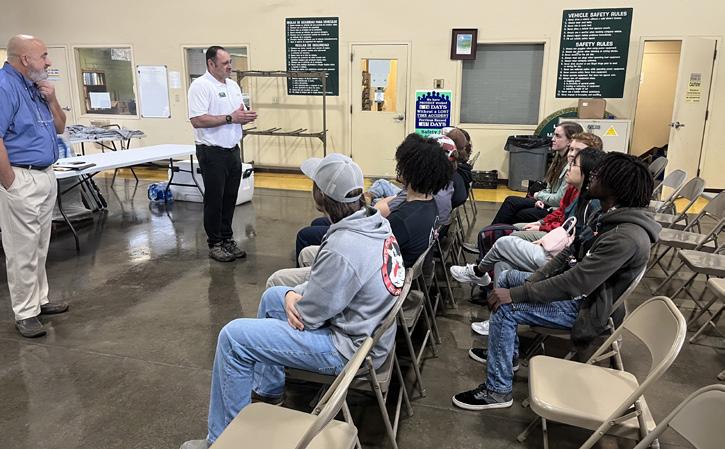
Boyd and more than 20 of his colleagues set up four stations, allowing students to rotate among the topics of irrigation, equipment operation, business management and landscape maintenance. Enthusiastic Bland employees worked alongside students and provided them with expertise and numerous opportunities to prepare for their individual contests.
Student participants enjoyed interacting with other competitors from various schools and regions of the state. Without a doubt, they were excited to learn from industry professionals while collaborating with both teammates and competitors.
Events like these provide a great platform for companies to interact with students and showcase their place in the landscape and nursery industry. Such opportunities can even lead to connections for summer internships and future employment. In fact, Daniel Wasserman, a member of NC State’s HortPack competition team, used last year’s workshop as a springboard toward a summer internship experience with Bland. Impressed with the company during the workshop, he reached out to them to inquire about opportunities after the experience. “I appreciate the workshops they hold to help horticulture
students prepare for the National Collegiate Landscape Competition,” says Wasserman. “It’s very generous for them to take time out of their busy schedules to help us learn through hands-on experience.” This year, Daniel, a senior from Raleigh, will be competing for the second time in landscape lighting, and hopes that his internship and workshop experiences will help drive him to a first-place finish in Provo.
Colleges and university horticulture programs encourage landscape companies to reach out and develop programs like this, which help educate students and ultimately benefit an industry that is thirsty for high-quality current and future employees. Contact your local NCLC coach today, from the list below, to learn more about future opportunities and collaborations:
North Carolina State University: Jodi Songer, jssonger@ncsu.edu
University of Mount Olive: Dr. Jason Davis, rdavis@umo.edu
Alamance Community College: Caleb Fox, cefox435@alamancecc.edu
Sandhills Community College: Hilarie Blevins, blevinsh@sandhills.edu
Wilkesboro Community College: Donna Riddle, deriddle368@wilkescc.edu

The North Carolina Irrigation Contractors’ Licensing Board (NCICLB) has a number of positive recent developments to report, including a new licensing exam that is due to launch this year; a new continuing education (CE) category, Education through Experience, that just successfully completed its first year in use; and a redesign of the NCICLB website. These are just a few of the changes currently underway.
From 2009 to 2023, the NCICLB used the Certified Irrigation Contractor (CIC) exam, prepared by the Irrigation Association (IA), as the licensing exam. In 2023, the NCICLB decided to have its own licensing exam created, and is excited to begin administering the new exam in 2024! Individuals do still have the ability to take the CIC through the IA and apply for licensure with the NCICLB via the previous CIC.
Individuals who wish to become licensed prior to implementation of the new exam are encouraged to take the CIC exam through the IA, in order to apply for a North Carolina Irrigation Contractor License using the previous CIC. Please note: solely passing the CIC exam does NOT grant licensure. After passing, you must complete the application and
licensing process through the NCICLB prior to receiving a license.
Candidates planning on taking the new NCICLB exam should study the North Carolina irrigation licensing law (§89G) and North Carolina rules (Chapter 23). Another main reference for this exam will be Irrigation (Third Edition), which can be purchased on the IA website, in bookstores, from online merchants or via used-book resellers (it may be worth shopping around for the best price!). Studying these references and knowing the laws and rules will be vital to passing the exam. Additional information or study resources will be shared as they become available. If you would like to be in the loop for information pertaining to the new
NCICLB exam, please email info@ nciclb.org and request to be added to the email list.
The NCICLB recently passed into effect a new CE category called Education through Experience, which allows licensees to receive up to three hours of CE credit for irrigation-related work performed on any given job. One hour of CE may be awarded per 40 documented hours of irrigation construction and contracting-related work. This new category was designed to give irrigation contractors credit for the valuable learning that takes place while on the job. Forty hours was decided upon as the basis for the hour calculation, since 40 hours are generally considered a “normal” work week, and since the knowledge and skills acquired during that time would equal, if not surpass, one hour of CE.
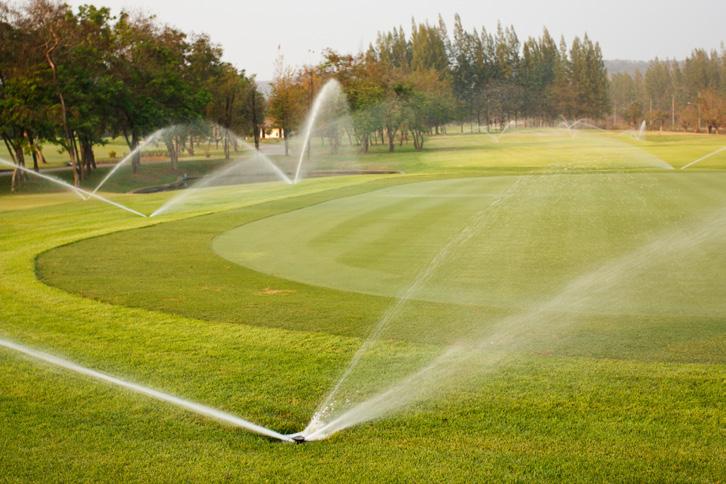
The NCICLB website is getting a new look this year! The layout and look of the site at nciclb.org has not been updated in many years. The public side of the site is getting a fresh design that will offer easier navigation and direct access to information and resources. As well, the website will now be adaptive to different screen sizes.
The launch date for the new website design has not yet been set, so keep an eye out over the coming months for updates!
• All irrigation licenses must be renewed annually, and are valid from January 1 through December 31.
• Ten hours of CE are required annually (six irrigation hours/four business hours).
• A $50 late fee will be assigned to each late license renewal.
• Late CE will also be accepted through March 1, 2024. If CE is completed during this time, an additional $250 reinstatement fee will be assessed, along with the $100 renewal fee and
the $50 late fee (be sure to complete your CE on time to save yourself the headache and extra fees!).
• CE hours MUST be completed by the individual license holder — it is unethical for a licensee to have another person complete CE hours. If the NCICLB learns of such an occurrence, an investigation will be launched.
• Need extra 2024 vehicle decals? Fill out an order form (found on the NCICLB website) and mail it in along with cash or a check.
• Licenses may be renewed at any time during the year! Have you already completed your 10 hours of CE? Do you have a valid surety bond? If you answered yes to both, then you are eligible to renew — we encourage you to get it done early to save yourself from having to rush at the end of the year.
If you have questions regarding licensure or are interested in serving on the NCICLB, please reach out to Margaret Geiger, board administrator (info@nciclb. org/919-872-2224).
Chairman
W. Charles Nieman cnieman@nciclb.org
Vice Chair
Kurt H. Bland kbland@nciclb.org
Treasurer
Daniel Christopher Baker dbaker@nciclb.org
Public Member
Shawn Lucas slucas@nciclb.org
Members
Charles A. Allen IV callen@nciclb.org
Charles William Hughes III chughes@nciclb.org
Dennis Pitts dpitts@nciclb.org
Chad Poole capoole2@ncsu.edu
Christopher Peyton Wynne cwynne@nciclb.org
Legal Counsel
Alexander Ward award@ncdoj.gov
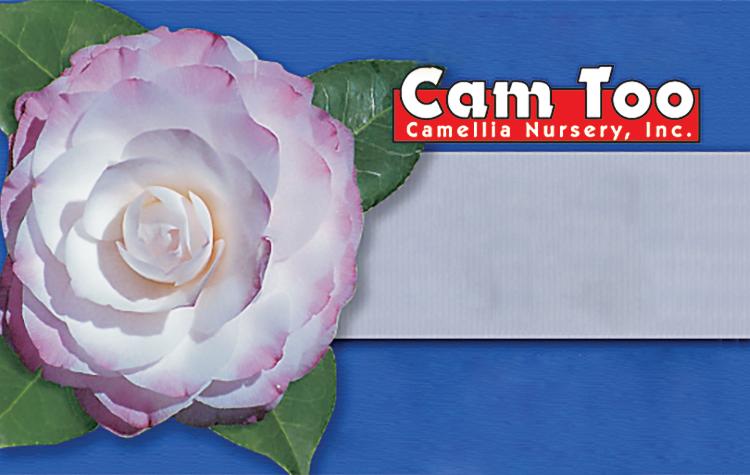

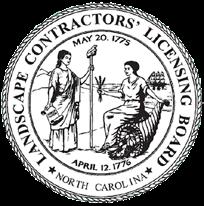
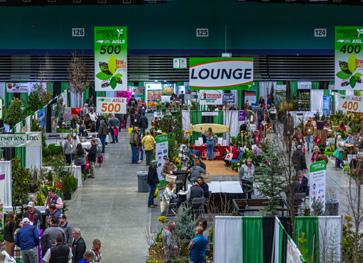
The North Carolina Landscape Contractors’ Licensing Board (NCLCLB) was busy at Green & Growin’ 24, staffing information tables during continuing education classes and assisting at the trade show with licensing inquiries on continuing education and licensing. Both days of the trade show were well attended and active — thank you to those who stopped by the continuing education help table and the NCLCLB exhibit booth! Interest in obtaining the North Carolina Landscape Contractors’ License continues to rise, as homeowners and businesses increasingly recognize the importance of hiring licensed landscape professionals. The sale of landscape study manuals has increased from last year as well, as greater numbers of landscapers prepare for the licensing exam.
During Green & Growin’ 24, we fielded numerous questions concerning unlicensed practice by landscapers and how to deal with the issue. Unlicensed practice complaints can be particularly demanding for licensing boards, due in part to the United States Supreme Court’s limitations on licensing boards’ enforcement powers in unlicensed cases, which complicate the NCLCLB’s authority to act on unsubstantiated complaints. Regardless, the NCLCLB encourages individuals to file any complaints with supporting evidence, if at all possible. Providing documentation, such as quotes or requests for proposals for the same job, greatly aids the investigation process and strengthens potential actions. Without such evidence, proving violations becomes notably more challenging — especially if cases go to court.
An unlicensed landscaper not only faces the possibility of complaints filed by the NCLCLB, leading to legal fees, but could also encounter difficulties in receiving payment for their services. This was highlighted by the North Carolina Supreme Court case Brady v. Fulghum, in which an unlicensed builder sued a homeowner for breach of contract. Even though the builder was found to have “substantially” complied with the construction contract, the court ruled in favor of the homeowner, stating that contracts illegally entered into by unlicensed contractors are unenforceable. This legal precedent could apply similarly to
landscapers, emphasizing the importance of obtaining proper licensing to avoid financial repercussions and legal disputes.
Of course, the best solution is for all landscapers who do — or might at some point — provide services for projects totaling $30,000 (including labor, materials and all other project-related costs), is to get licensed and save themselves a lot of money, time and reputational harm.
Another topic of interest to attendees was an Economic Impact Study being conducted by North Carolina State University and the College of Agriculture and Life Sciences, and developed in conjunction with the North Carolina Department of Agriculture and Consumer Services. The objective of the landmark study is to highlight the critical role of the North Carolina green industry in driving job creation, growing the economy, safeguarding our environment and enhancing the beauty of our state. Your participation in the study can be of tremendous value to the landscape industry, as well as to all green industry partners, so please take the opportunity to participate. Additional information will be available soon on the NCNLA or North Carolina Green Industry Council websites.
Finally, every year at its annual meeting, the NCLCLB provides an update on complaints processed during the prior year. In 2023, the office processed 52 complaints — 30 more than in 2022.
Of those complaints, 24 were against licensees for minimum standards violations. One case was dismissed for lack of jurisdiction, 16 were dismissed with a warning or reprimand, and seven were found to have probable cause for sanctions.
In 2023, there were also 28 complaints for unlicensed practice — 6 more than in 2022. Of those complaints, 12 of the complaints were dismissed for lack of authority, two were dismissed with a warning, and the remaining 14 were found to have sufficient evidence of probable cause for the NCLCLB to seek an injunction by the court.
A summary of complaints and enforcement actions can be found on the NCLCLB website at nclclb.com.

Whether your crews are excavating, mulching, planting, grading or removing snow and ice, you’ll get the most out of Cat ® landscaping equipment. Get jobs done faster— and more safely—with our wide range of attachments and quick couplers, allowing easy tool changes to tackle a wide variety of applications. With top-of-the-line technology and 24/7 support, we’re here to level every landscape with you.
The North Carolina Department of Agriculture and Consumer Services (NCDA&CS) – Plant Industry Division has seen an uptick in the online sales and marketing of live plants — an increase facilitated primarily by large producers fulfilling online orders for third-party companies, as well as smaller startups offering their plants for sale online. In light of this emerging trend, it’s important to note that selling plants nationwide requires regulatory evaluation to ensure that plant shipments comply with the mission of the United States Department of Agriculture – Animal and Plant Health Inspection Service’s (USDA-APHIS): to “protect the health of U.S. agriculture and natural resources against invasive pests and diseases.” All states enforce regulations to meet this mission, given that all states have vested interests in safeguarding their citizens from potential newly introduced pests, which can have a detrimental impact on a state’s ecosystem(s) and economy.
Some of the most common regulated pests transported on nursery material are Japanese beetle (Popilla japonica), Spongy (gypsy) moth (Lymantria dispar), imported fire ant (Solenopsis invicta), spotted lanternfly (Lycorma delicatula), boxwood blight (Cylindrocladium buxicola), sudden oak death (Phytopthora ramorum), harmful nematodes, invasive weeds and non-native terrestrial snails. However, new regulated pests are added to the list frequently due to domestic and international trade, as well
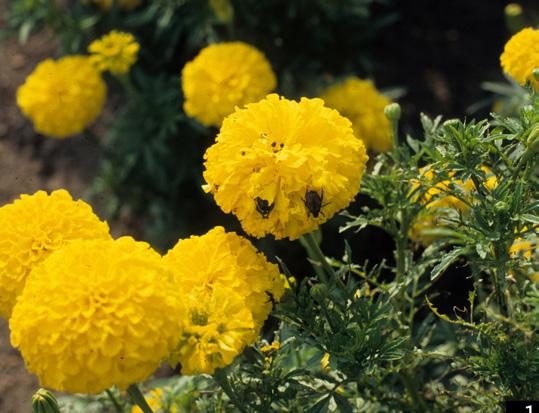
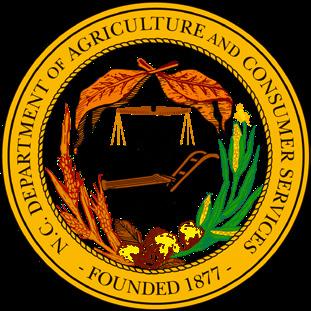
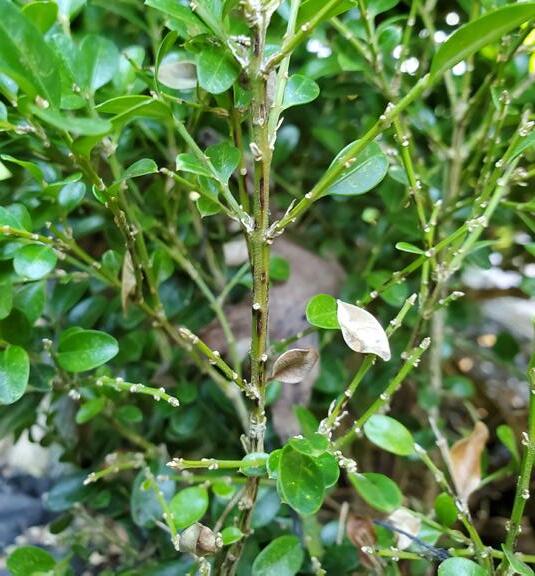
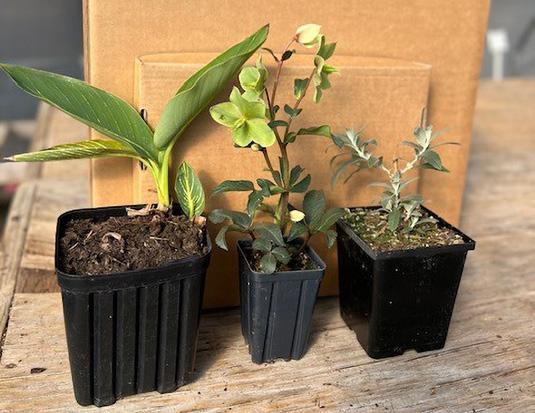
as other human activities. In general, nursery stock should be deemed apparently free of all injurious pests before being sold anywhere, but specific guidelines and required treatments are mandated at state and national levels to prevent the introduction of pests to new areas.
Importantly, all North Carolina growers who ship nursery stock out of state are required to obtain a Certified Nursery License through NCDA&CS. During the certification process, NCDA&CS Plant Pest Specialists assist producers with all certification and documentation needed to ensure that plant shipments reach their final destinations with no costly regulatory hurdles. Individual state regulations for nursery
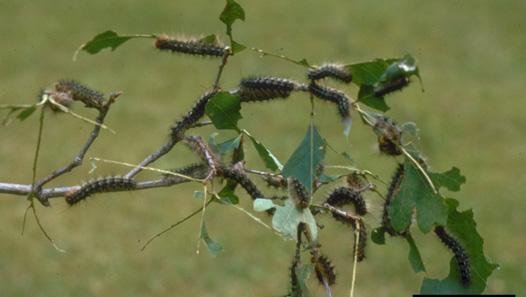
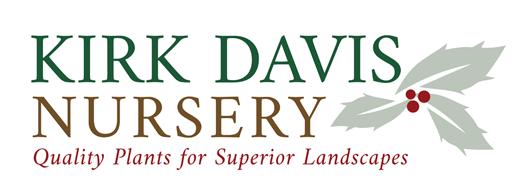
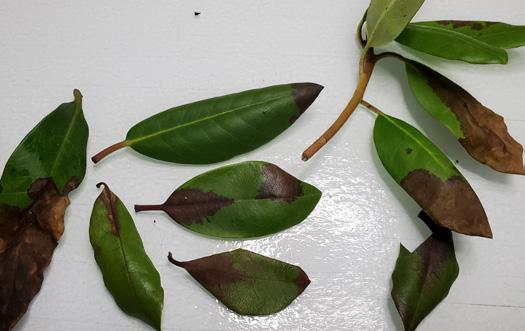
stock can be found on the National Plant Board website (nationalplantboard.org) under the Laws and Regulations tab. Online sales have also increased demand for the export of North Carolina plants internationally. All NCDA&CS Plant Pest Specialists, as Authorized Certification Officials through USDA-APHIS, can help producers research import requirements for international shipments, conduct export inspections and issue Federal Phytosanitary Certificates.
If you are selling nursery stock and/or planning to ship outside of North Carolina, please contact NCDA&CS, and we will answer any questions you may have and assist with your certification needs. For more information, visit www.ncagr.gov/divisions/plant-industry/plant-protection.


As a common saying goes, “Cash is like oxygen — you don’t think about it until it isn’t there.”
Cash is critical to all businesses. Whether in the form of paper dollars from customers or digital ones and zeros in a bank account, every business needs cash to remain viable. However, many businesses fail to monitor their cash flows or put plans in place to manage cash and cash flows effectively. Operating without such proper planning might work — temporarily and when times are good. But we all know that there are potholes in the proverbial road of business, and failing to implement appropriate cash plans can lead a business to run off the road, so to speak.
All businesses need some amount of cash in reserve at all times. Sometimes referred to as a buffer, an emergency fund or operating capital, this is cash that can be used for unexpected expenses or unpredictable fluctuations in normal business operations. Just as with one’s personal finances, having a cash buffer is imperative to running a business successfully and responsibly over the long term. Studies have found that approximately 80% of small business failures occur due to cash flow problems, and having a cash reserve can help businesses navigate through unexpected bumps in the road. Of course, at times conditions may still be challenging and require tough choices, but having adequate cash on hand provides a business with the “oxygen” it needs to survive.
So, how much buffer cash should a business have on hand? The answer will vary based on the industry and the operating
needs of the business. Most experts recommend maintaining a reserve equal to at least two months of operating expenses, but for many businesses, three to six months may be more appropriate.
The second essential item for cash management is an up-to-date pro forma budget. Using historical data and current business and market conditions, businesses should project their future income and expenses over the coming 12 months — or longer. Many people are intimidated by this exercise, since it’s impossible to predict the future accurately. However, this budget doesn’t need to be 100% accurate to the penny; instead, it should provide broad strokes for planning purposes. It’s extremely important to remember that this document should be realistic, not aspirational — for instance, projecting a 25% growth rate when the past two years have seen 5% growth likely will not lead to accurate budget models.
A good starting point for a basic pro forma budget is to review your income statement for the previous 12-18 months on a cash basis. Some expenses and income will be relatively fixed and can be projected forward easily, and some trends will be easy to spot. For example, perhaps a particular line of business has grown roughly 5% a month for the past 18 months. If no market changes are expected, this could reasonably be projected to grow at the same rate over the next 12 months. Some income and expenses, on the other hand, will have significant variances and be difficult (or even impossible) to project forward. For these, you should make the best estimate possible and keep refining and updating as time goes on. Although no cash flow plan or pro forma budget will be 100% accurate and include every possible item, a cash buffer will serve to provide a cushion to cover unforeseen expenses.
The next step is to create your cash flow plan. Using your beginning cash balances as the starting point and projecting your monthly net income from the pro forma budget you prepared, you can calculate the projected cash balance of the business over time. Be sure to include large, infrequent purchases; capital expenditures such as large equipment, inventory or vehicles;
and debt payments — items that will not show up on the income statement. By scheduling these items on the cash flow plan in the month they will be paid, you’ll be able to project when cash may accumulate, or when large cash outlays may be needed.
One other item to think about is cash collections timing. If the business is on accrual basis accounting, income may be recognized in months before the cash for that income is collected. In that case, I suggest reviewing the business collections and adding cash adjustments as necessary that match historical trends.
Then, using this plan, identify the expenses, debt obligations or capital purchases the business needs to save for. Once these items are added, this plan will help you see how much excess cash will be available to distribute to owners, and how much cash will need to be held in the business to meet projected future needs or to serve as the cash reserve.
If your cash position is generally tight, a monthly cash flow plan might not be suitable. In that case, a shorter-term cash plan covering two to three months can be built at a daily or weekly level of detail. This plan, sometimes referred to as a “cash walk,” helps identify cash inflows and outlays at the daily or weekly level to assist in managing tight cash situations.
By putting all these items in place, cash flow problems can be mitigated, reducing the risk of business stress — or even failure. At a minimum, a cash plan can help the business owner be aware of potential cash issues long before a dire situation arises.

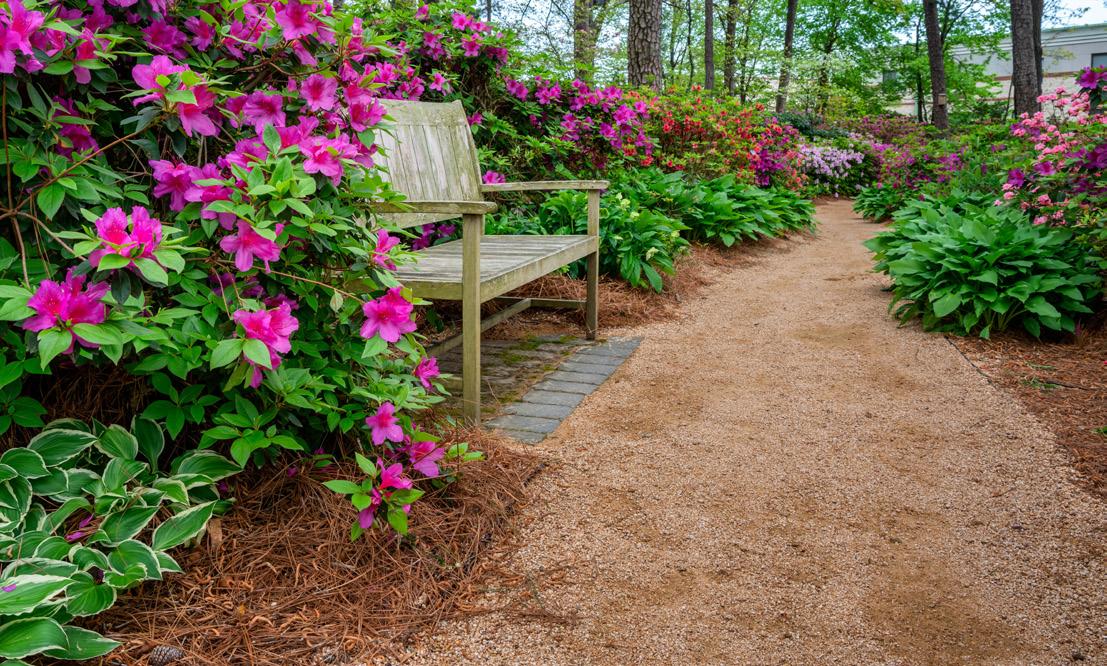
In 1986, when we decided to embark on our full-time nursery careers, my late wife, Michelle, and I purchased a 2.2-acre abandoned tobacco field, complete with a newly built starter house in Southern Wake County, 20 minutes south of Raleigh.

I had long wanted to start a specialty plant mail-order nursery, but it became obvious as I was preparing to graduate from North Carolina State University in 1978 that, despite having decent plant knowledge, I didn’t have any of the business or facilities skills needed to manage a successful nursery. That realization prompted a detour that resulted in a 16-year career working for the North Carolina Department of
Agriculture, managing the landscape program for the North Carolina State Fairgrounds.
Although we now had property for our nursery, my commitment to the fairgrounds meant the nursery would have to start as a hobby. Finally, in 1994, the fairgrounds landscape was at a good point, and our fledgling nursery had grown financially sustainable enough for me to make the leap to fulltime nurseryman.
Having been a plant collector long before attending NC State, it was fortuitous that I arrived there the same year (1974) as Dr. J.C. Raulston, who reinforced my belief that a niche collector nursery was the way we wanted to proceed. This meant plant sales volume would be relatively small, and a monumental marketing effort would be needed to sell plants that most folks had never heard of. We also understood that mail order was the
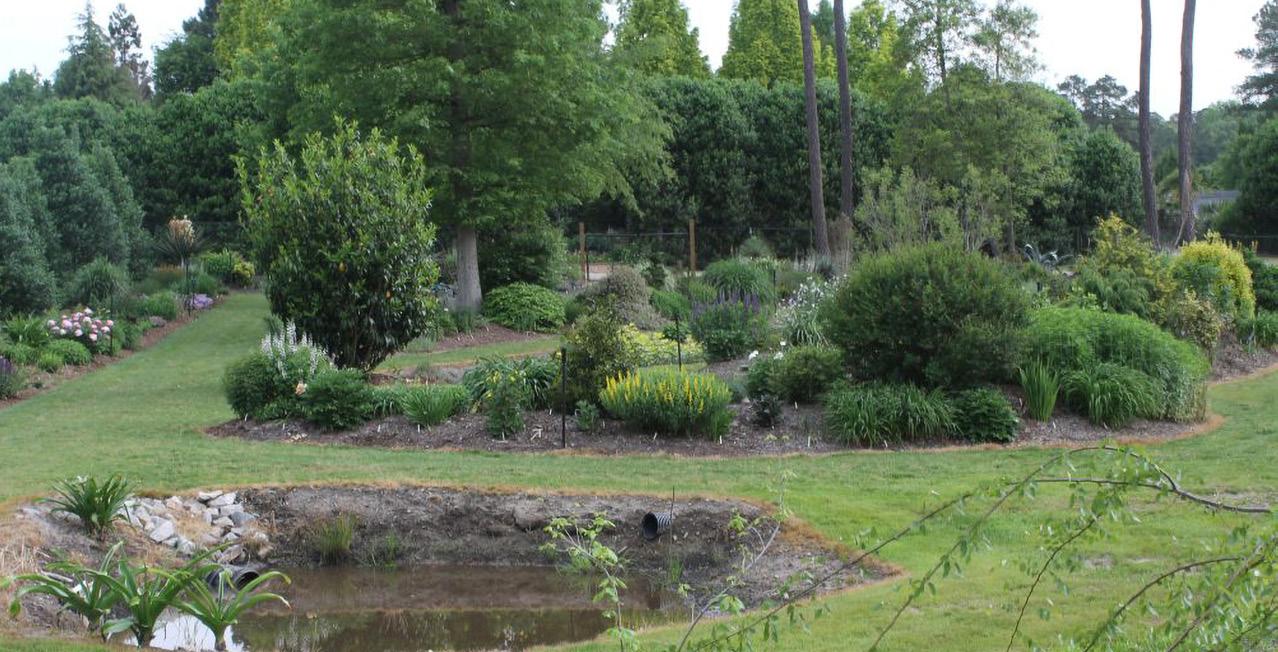
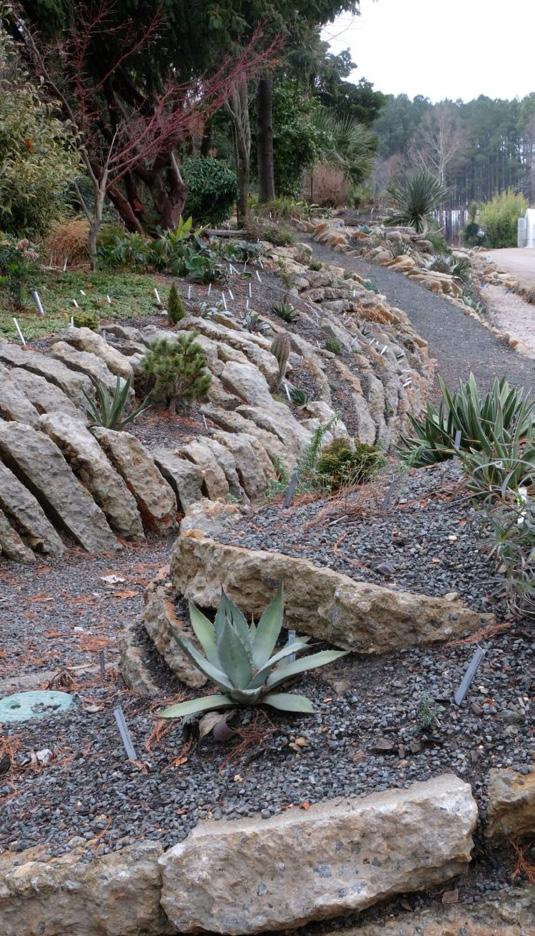
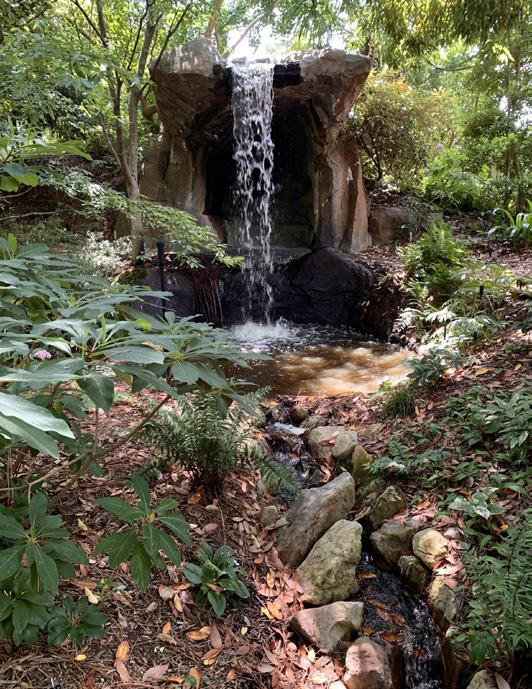
only way we would be able to reach enough collectors of littleknown plants to make our business model viable.
A specialty boutique nursery would also mean that we needed to propagate our own plants, since most of our offerings would be unavailable from commercial liner sources. My interest wasn’t just to sell these plants, but to also grow and learn about the plants firsthand. The obvious solution was to start our own botanic garden — now known as Juniper Level Botanic Garden (JLBG) — in conjunction with the nursery.
We were already familiar with the other public gardens in the region and had studied how we would differentiate our garden from each of them. These included the North Carolina Botanical Garden (which specialized in native plants), Sandhills Community College Garden (landscape design/woodies), Duke Gardens (Asian, native and large seasonal display) and what is now the JC Raulston Arboretum (woodies). Our initial model was to focus the garden on an unusually wide diversity of perennials and rock garden plants, with a strong woody plant background.
Our other founding idea, which we’ve stuck to for 38 years, was to have a limited-access botanic garden where public visitation was restricted to a few weekends during each season and a few special events, and otherwise by appointment only. This would allow us to focus our labor efforts on plant production and building out the gardens. We settled on a financial model in which 15% of the income from the nursery would fund the botanic garden and its work. In return, plants sold in the nursery would be propagated from the botanic garden collections.
One of the lessons learned from my time at the fairgrounds was that the effort put into building and installing a garden make up only a small fraction of the time and costs involved. Maintenance of the garden requires at least 80-90% of the operational costs and labor. Unlike one-time installation costs, the costs of maintaining the garden never go away. From my observations, it seemed this was the most likely reason others before us might have be unable to make similar endeavors succeed over the long term.
To minimize future garden maintenance, we needed to preemptively address several issues thorough soil preparation, weed management, visitor accessibility, installation of irrigation and other infrastructure, and land shaping. I did not feel it was possible to simultaneously manage both a nursery and botanic garden without dealing with these labor-reduction items in advance.
First, the soil needed to be properly prepared. Since we were on old tobacco land, the pH level was a meager 3.2, with a poor nutrient (nitrogen, potassium) load, and there was virtually no microbial activity, due to extended prior chemical use. A massive amount of compost was hauled onto the property, mostly from a giant public compost pile we maintained at the fairgrounds. Nutrients were all added organically, through a combination of greensand and compost, supplemented as needed with Espoma organic fertilizer products. Over a period of time, the entire planted area of the garden became a mix of 50% native soil/50% compost.
Land shaping was also an important component of developing the botanic garden, providing an aesthetic presentation for plants, enabling the creation of unique plant habitats and helping to manage water flow. Water is one of the most powerful natural elements, so failing to understand and manage garden water ahead of time can have disastrous consequences. JLBG is full of natural springs, so all grading was designed to take advantage of these natural gifts, rather than try to make them disappear. This resulted in a series of water-retention or rain gardens throughout the property.
Future irrigation needs were also planned out, including locations for frost-free standpipes and risers for the entire garden irrigation system. Electricity and irrigation system control wires were also a part of the project. As the garden
expanded to 7.5 acres (1996), 18.5 acres (2000), 22 acres (2008) and 28 acres (2015), the same system installations followed. Our first advanced irrigation controller for both the nursery and garden was a Wilbur system, followed by a Tucor system. Weeds are the scourge of virtually all gardens, either botanic or at home, and unfortunately, weed seed counts in our region exceed several thousand per square foot of bare soils. We felt it made more sense to pre-emptively address this issue, instead of waiting until weeds took over the garden. The downwind side of the garden was screened with a hedge of Ilex ‘Nellie R. Stevens,’ which served as a trap crop to catch most seed blowing into the garden from the southwest. The second piece of our weed-control strategy was to eliminate all existing weeds on the property, being sure to never allow any


new seed to be deposited. We initially used plastic solarization, but after reading studies that showed its devastating effect on microbial populations, we switched to Roundup to supplement our program of physical weed removal.
I’m not adept at laying out gardens on paper, so all garden layout design was done while walking the property with a bundle of multicolored survey flags. We used one color to designate paths, others to designate tree and shrub locations, etc. Path widths are critical for both maintenance and visitor accessibility. I also find it very important to use a specific color to designate the mature spread of both trees and shrubs, which helps ensure that we allow enough room and don’t incur the need to trim overgrown shrubs in the future, due to incorrect spacing.
Once the soil was prepared, plants were subsequently installed over a period of many years, with trees going in first, followed by shrubs and then perennials. Many areas where small trees were installed started out as full sun, before gradually transitioning to shade as the plants matured.
Garden planting design is usually either collections-focused or design-focused — whichever has the higher priority. We are a collections-driven garden with a strong aesthetic component. The aesthetic principals that drove our planting design included a desire to give the garden year-round interest, with a focus on textures, forms and color.
Other than proper planting and maintenance, what sets a botanic garden/arboretum apart from a park-like landscape is a focus on the plant collections and the plant records. Both terms, botanic garden and arboretum, have been widely misused for public landscapes, most of which have no interest in or capability of putting in the required work to acquire botanically significant plant collections, or to input and maintain proper plant records.
We were fortunate to have a tech-savvy friend who, early in our development, helped us set up a Microsoft Access database to help us track plant names, dates acquired, dates planted, bed names, plant locations, plant sources, wild collection data and a number of performance fields. In our 38th year, we currently have more than 87,000 plant records in our database.
Over that time, our botanic garden focus has shifted slightly to put more emphasis on off-site conservation of wild plant collections — especially those plants that are endangered or threatened in the wild.
This brings us to the final piece to consider when starting your own botanic garden or arboretum: What is the succession plan? Just like an exit strategy for a business, a true botanic garden
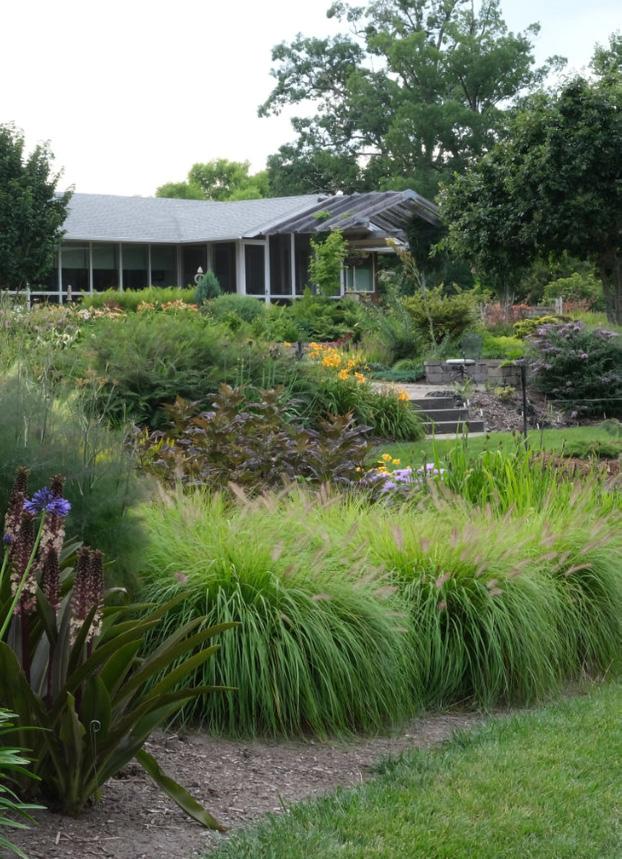
is a valuable botanical resource that will need to be preserved. There are organizations willing to help with this, if the garden has significant botanical value. In the past, I’ve worked with garden owners who wanted to have their gardens preserved — and while the gardens were lovely, there was no compellingly significant plant collection or any plant records. In all cases, those wound up as part of a public park system.
We were very blessed to have JLBG accepted for conservation by NC State, although they were quick to point out that they had no funds for maintenance. The university was, however, willing to set up an endowment fund through the North Carolina Agricultural Foundation that, when fully funded, will be able to fund the operation of the garden in perpetuity. I was afforded fundraiser status, working along with our development director, Alycia Thornton of the College of Agriculture and Life Sciences at NC State. JLBG currently has 15 full-time garden staff, with a yearly budget of more than $500,000. For the JLBG garden to be maintained at its current level, an endowment of $20 million will be required. As of the end of 2023, we have raised $3.3 million, so we are well on the way.
As you can probably see, building your own botanic garden/ arboretum is neither easy nor inexpensive. If you still have an interest in starting your own garden or are interested in donating to the JLBG endowment fund, we are delighted to have you visit and answer any questions you may have. You can learn more about JLBG or donate to the endowment at JLBG.org.
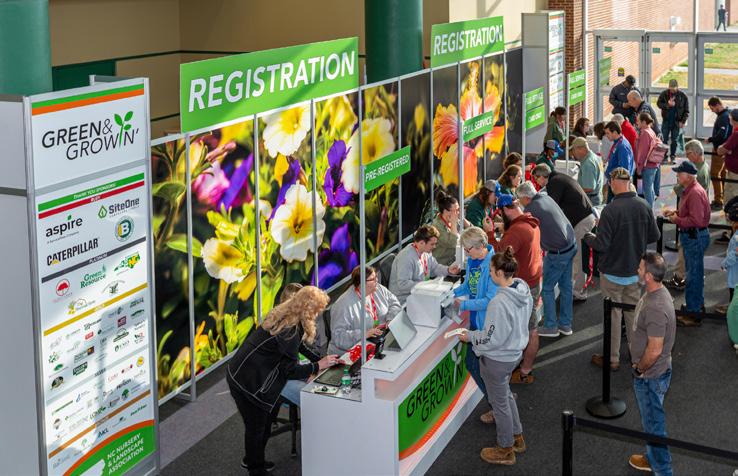
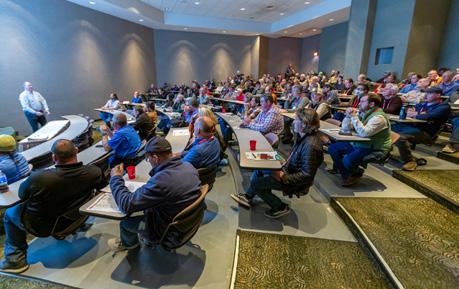
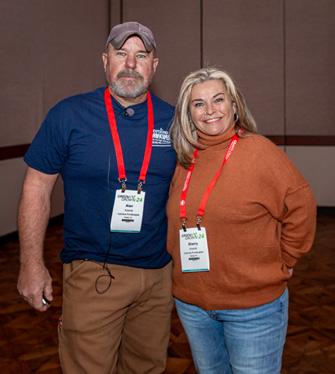
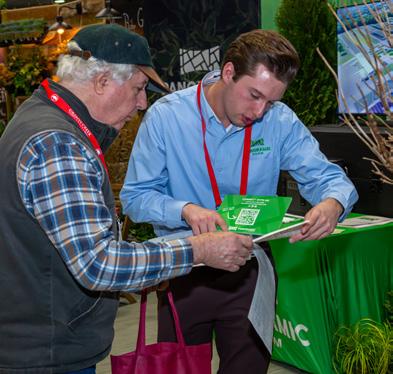
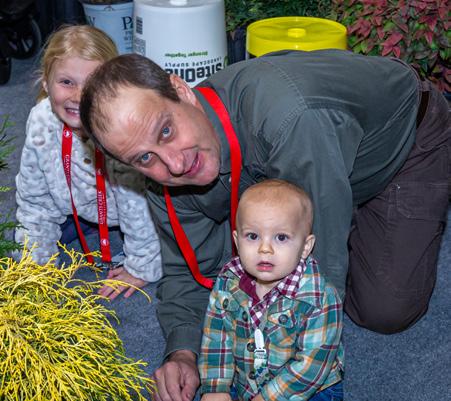
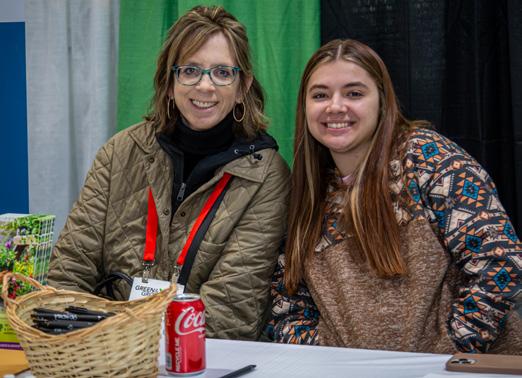
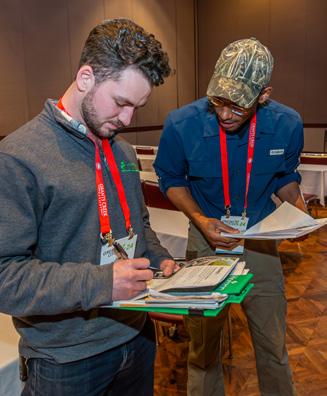
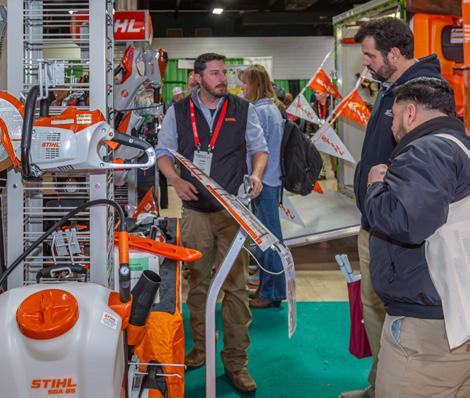
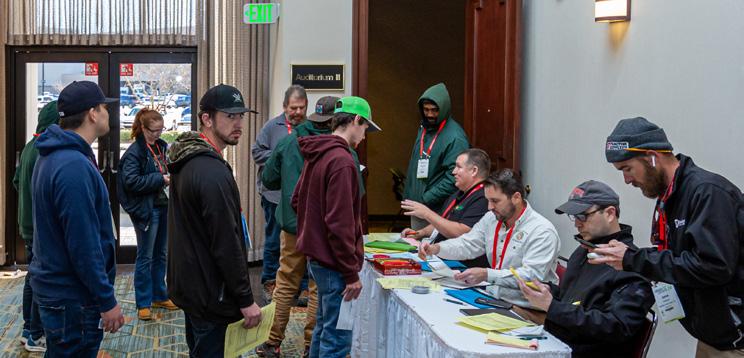



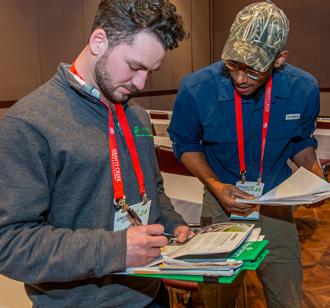
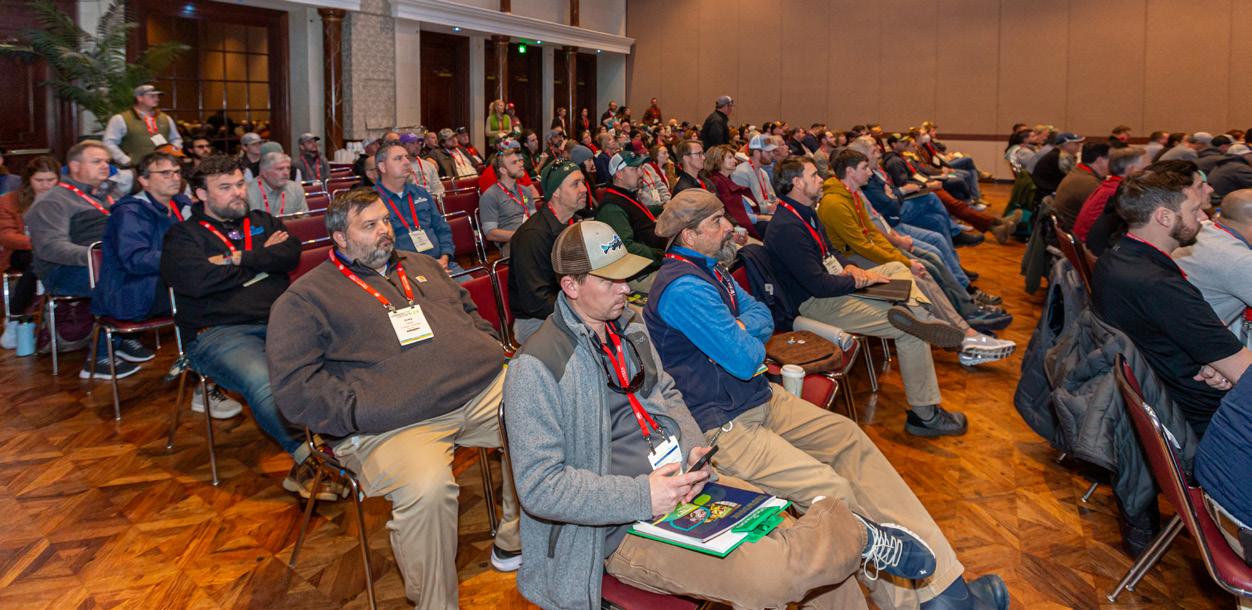
The Green & Growin’ 24 Education Conference was truly remarkable, with more than 1,300 industry professionals convening at the Sheraton Greensboro for a three-day event focused on learning, growth, and earning credits toward state and national licenses and certifications.
This year’s program featured 48 general education sessions, six specialty sessions, two exams and two keynote addresses. The standout general sessions included:
• “Conquering Unruly Weeds,” presented by Dr. Joe Neal, who
graciously joined us via Zoom, despite being under the weather. This session garnered one of the event’s highest attendances.
• “Current Best Management Practices for Boxwood in the Landscape,” presented by Dr. Holly Scoggins of NewGen® Boxwood, who braved challenging weather conditions to deliver this session, which drew another one of the highest attendances.
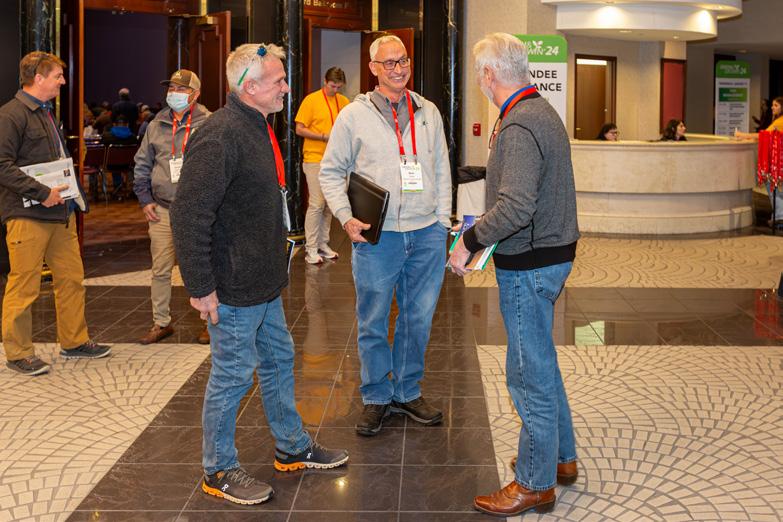
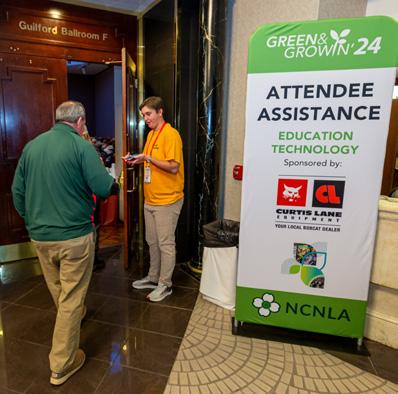
New presenters this year included Rayne Gibson, presenting “Generational Succession Planning” and “Unleashing the Power of Data Analytics,” and Edward Morrow, an ISAcertified arborist, accountant and author, who presented “Soft Skills for Tree Professionals” and “Green Industry Accounting.”
Other notable additions this year included a CPP review hosted by Danny Lauderdale, Cyndi Lauderdale, Sam Marshall and Colby Griffin, providing a final study push before some attendees sat for the CPP exam. Additionally, a special thank-you goes to SiteOne for presenting its lighting and irrigation specialty workshops and offering personalized feedback to attendees. Lastly, Richard Lodwig led the “Sustainable and Profitable Planting Design” workshop, earning enthusiastic reviews for its hands-on approach to sustainable design, with a focus on the judicious use of plant material — especially natives and ecosmart choices.
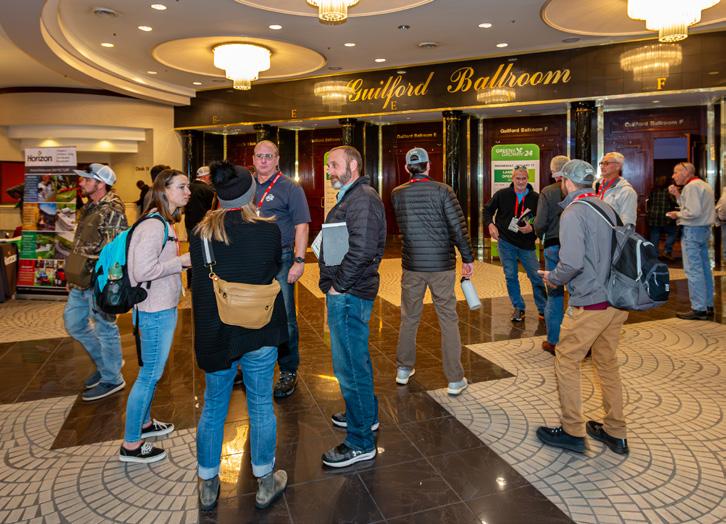
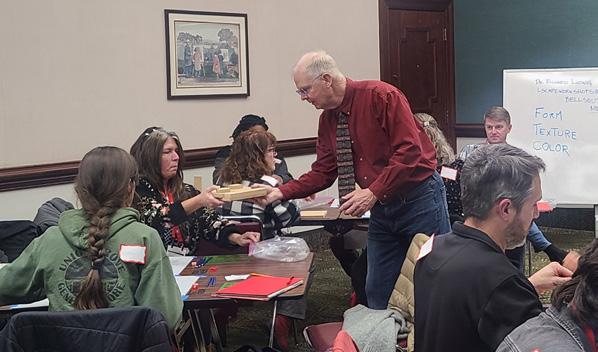
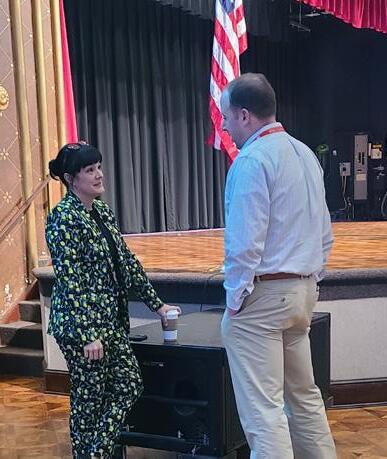
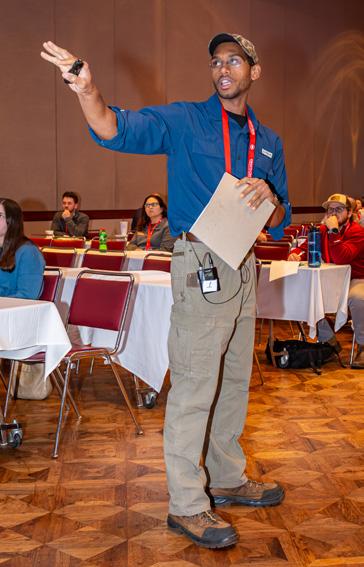
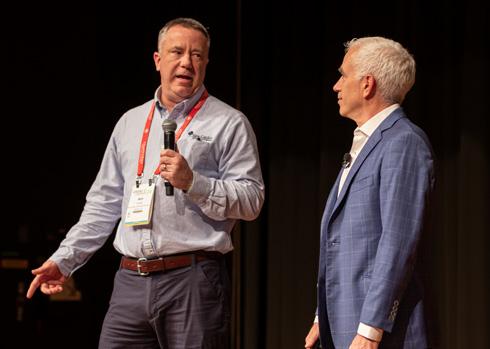
We must not overlook the extraordinary keynote speakers who graced us with their presentations — what an unforgettable experience they provided!
• Tuesday’s speaker, Leslie Halleck, addressed the importance of driving industry trends instead of chasing them. She urged attendees to become thought leaders, innovate and lead, rather than merely reacting to trends.
• Wednesday’s speaker, Jeffrey Scott, delved into the challenges of business planning and human resources, emphasizing the importance of identifying a reliable No. 2
within your company to broaden strategic perspectives and boost team morale.
Finally, the success of this year’s Education Conference was only made possible by the contributions of attendees, licensing board representatives, speakers, sponsors, volunteers, vendor partners, and the NCNLA board and staff. A heartfelt thank you goes out to everyone involved. Looking forward, we can’t wait to see what the 2025 Education Conference will bring!
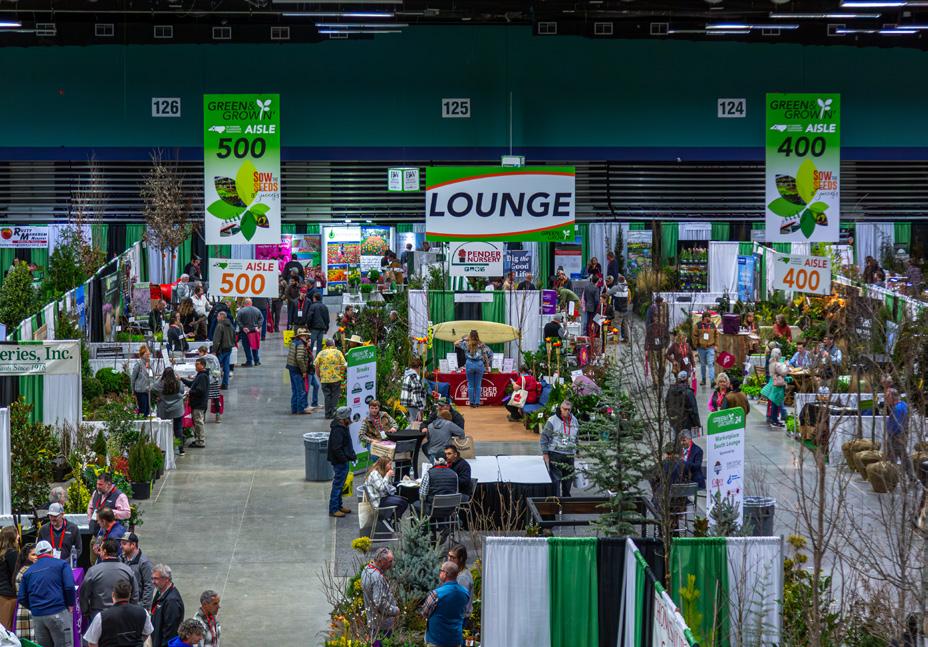
Green industry professionals from across the Southeast and beyond converged January 18-19 at the Green & Growin’ 24 Marketplace, held at the Greensboro Coliseum Special Events Center. More than 350 exhibitors, both new and returning, arrived from across the United States and Canada to showcase a diverse array of products, equipment, plant materials and services.
NCNLA was thrilled to bring back several popular amenities and attractions to the Green & Growin’ 24 Marketplace. Throughout Thursday and Friday, exhibitors and attendees had the opportunity to enjoy morning coffee stations, complimentary lunches and afternoon snack breaks, enabling attendees to make the most of their time on the show floor. In addition, SiteOne Landscape Supply and Stihl conducted live demonstrations — four on Thursday and two on Friday — covering topics such as “Synthetic Turf Installation,”
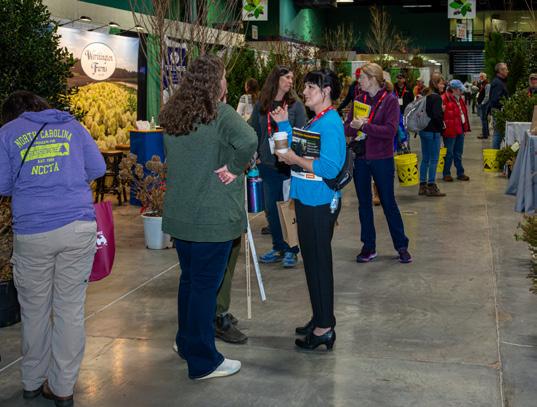
I know that Green & Growin’ is going to be successful when Skip shows up to feed the hardworking move-in team, and this year he didn’t disappoint — his ribs and brisket were on point! Other highlights for me were getting the chance to network and see old friends.
If Green & Growin’ 24 was any indication, we should expect a big year in the industry! But did I mention Skip’s ribs and brisket?!
— Ariel Montanez, Pender Nursery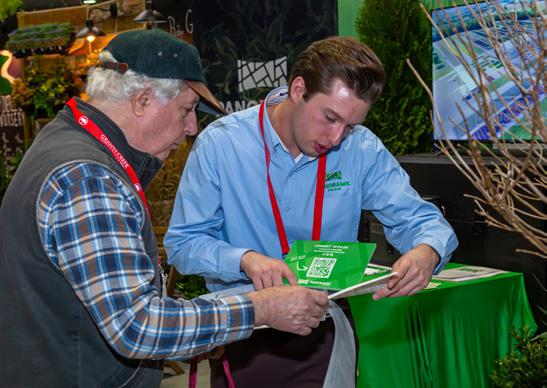
“Landscape Tool Maintenance and Safety,” “Open Graded Base with Nitro Sand,” “Chainsaw Safety, Maintenance and Operation,” “Natural Stone Flooring Installation” and “Battery-Operated Equipment.” Exhibitors and attendees alike were encouraged to attend, learn and participate. We sincerely thank all attendees, exhibitors, volunteers and sponsors for their contributions to the success of the Green & Growin’ 24 Marketplace, and we eagerly look forward to reconnecting with everyone in 2025!
Being an exhibitor at Green & Growin’ over the past 28 years, McCorkle Nurseries values this show as one of the best for networking with our current customers and welcoming new ones. The ease and efficiency of working with the accommodations, venue and NCNLA staff are second to none. It is also so encouraging to see the next generation of horticulture students in attendance, as they will be the ones taking our industry to the next level. The hospitality and professionalism on display at Green & Growin’ keep us looking forward to returning each year. Thank you for making it another successful show in 2024!
— Reid Hargrove, McCorkle Nurseries Inc.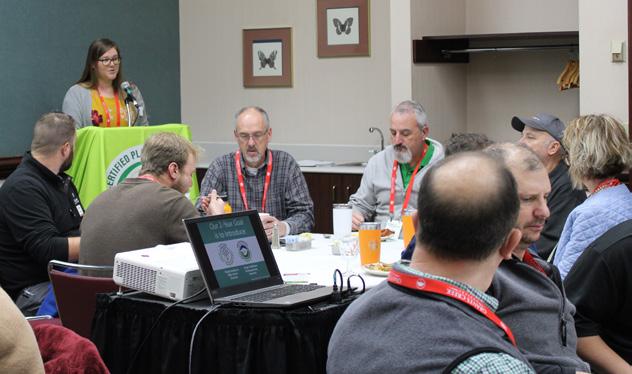
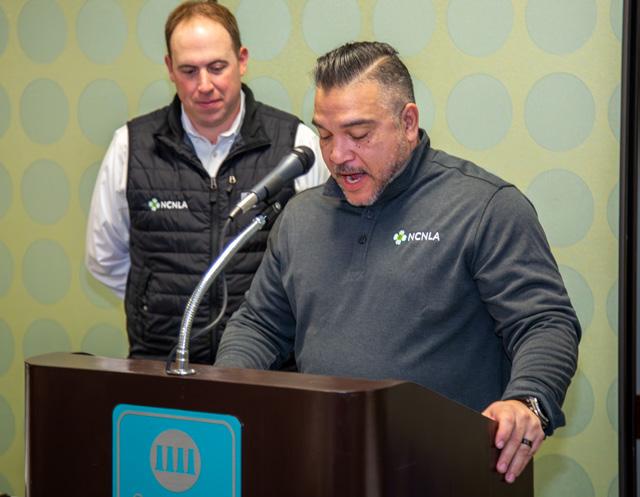
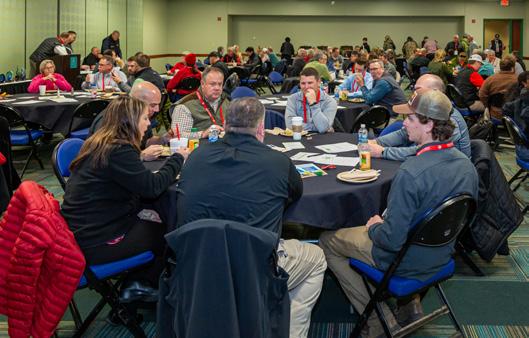
New this year was a Certified Plant Professional (CPP) Breakfast, hosted by Amanda Wilkins, CPP Committee chair, and Katie Rodrigues, NCNLA’s director of events and education. CPPs were invited to enjoy a hot, delicious breakfast and network with fellow CPPs and NCNLA board members at the event, held at the Sheraton on Wednesday morning at 7:30 AM.
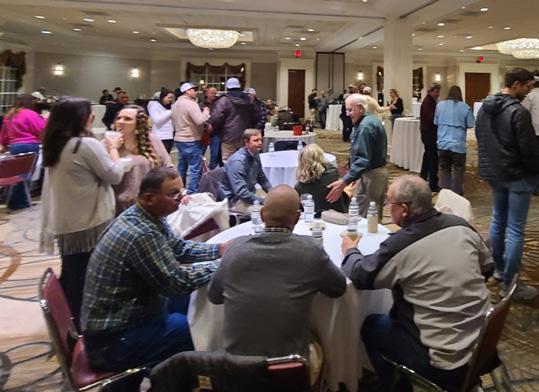
On Thursday evening, Green & Growin’ participants were welcomed to the second annual President’s Reception, hosted by Caterpillar. The event gave attendees a chance to enjoy desserts and drinks, socialize, and connect with friends and colleagues. Back by popular demand was the cornhole tournament in support of the NCNLA scholarship program. The tournament offered fantastic prizes, enjoyable conversation and plenty of smiles all around.
Held Thursday morning at 7:30 AM at the Greensboro Coliseum, the NCNLA Member Breakfast & Annual Meeting gave all NCNLA members an opportunity to gather for breakfast and hear the president’s report on the state of the association. The meeting included updates from industry partners, the installation of new board members and recognition of the 2023 NCNLA award recipients (see page 20).
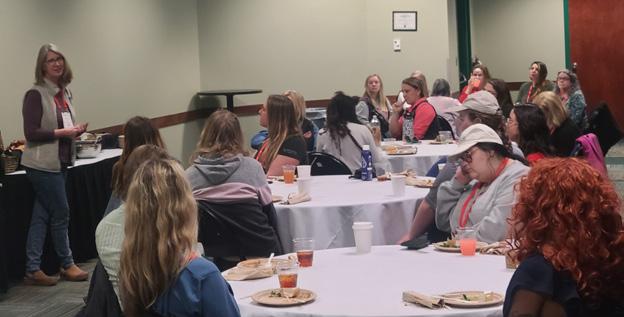
The annual Women in the Green Industry Gathering, held Friday at 11:30 AM at the Greensboro Coliseum, gave attendees an opportunity to join industry colleagues for refreshments and networking. This year’s special guest was none other than Shannon Currey, who shared highlights of her career in the horticulture industry.
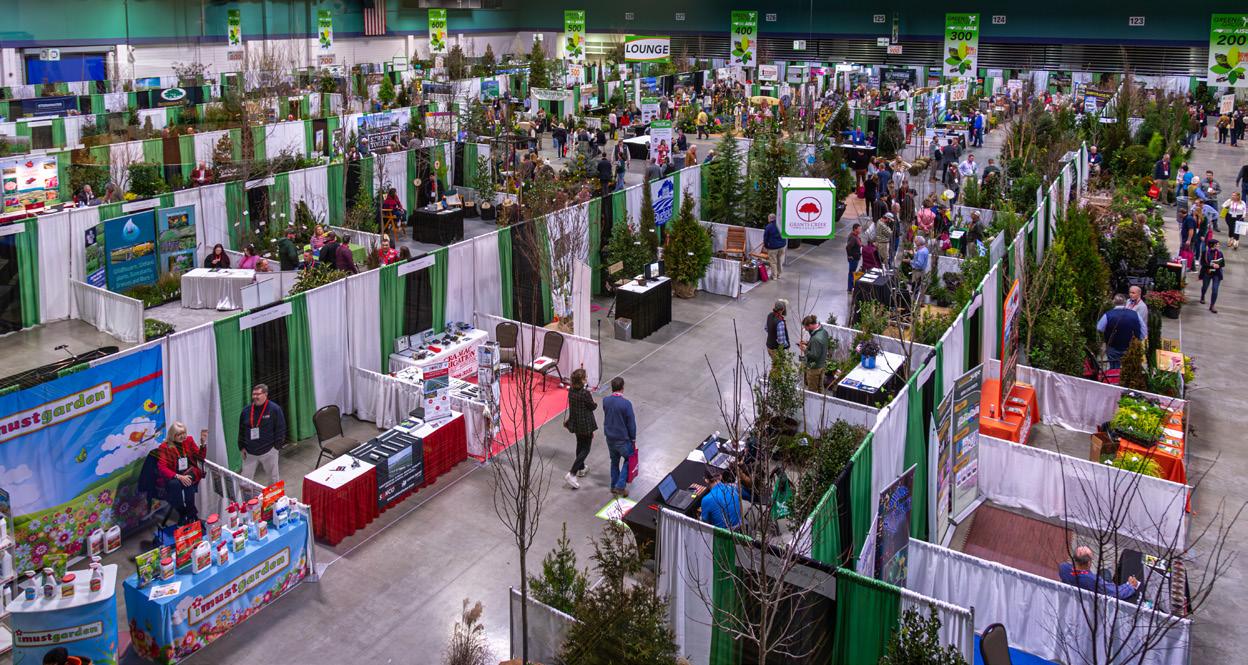
A.D.R Bulbs, Inc.
A.M. Leonard
Adcock’s Nursery
Advanced Turf Solutions
After Hours Nursery, LLC
Agri Supply
Alamance Community College-Horticulture Technology
All American Gutter Protection
Amick’s Superstore
Angel Creek Nursery, Inc.
Apex Nurseries, Inc.
Appalachian Farms of Cranberry, LLC
Arbor Fields Inc
Arborbrace
Atlas Greenhouse
Back Road Farms
Bailey Nurseries, Inc.
Baker Environmental Nursery Inc.
Bamboo Supply Company
BASF
Baucom’s Nursery Co.
Belgard
Bennett’s Creek Nursery
BFG Supply
Big Frog Nursery
BioPlex Organics a division of Turf Chemicals Plus, Inc.
BioSafe Systems
Bland Landscaping Company
Blankenship Farms & Nursery
Bluefields Nursery Co. LLC
Bob Young’s Nursery
Bobbex Inc.
Bottoms Nursery, LLC.
Bouldin Nursery & Greenhouse
Breezy Sunset Farm
Brooksville Palms
Brunson Wholesale Nursery LLC
Bryan Wagoner Tree Farm LLC
Buds and Blooms Nursery
Buffalo Horticulture Sales Co
Buy Sod, Inc.
BWI Companies
C & J Nursery, LLC
Cam Too Camellia Nursery
Carden & Associates, Inc.
Carolina Bay Construction and Maintenance, LLC
Carolina Boxwoods, Inc.
Carolina Landscape Supplies, Inc.
Carolina Native Nursery
Carolina Stalite (Environmental)
Carroll’s Plant Center, Inc.
Carver Brothers Turf
Casey Nursery, Inc.
Caterpillar Inc.
CCS Equipment Sales LLC
Centertown Nursery
Charleston Aquatic & Environmental, Inc.
Charlie’s Creek Nursery, Inc.
Cherokee Manufacturing
Clarity Connect, Inc.
Classic Groundcovers, Inc.
Cline’s Nursery
Commercial Pine Straw
Country Ridge Nursery
County Line Tree Farm
Creekside Farms Nursery
Crumpler Plastic Pipe, Inc.
Currin’s Nursery, Inc.
Curtis Lane Equipment
Daddy Pete’s Plant Pleaser
Davis Insurance Agency
Day Lily Nursery
Dayton Bag & Burlap
Del Norte Harvesting LLC
Dewar Nurseries Inc.
Diddley Dadburn Tree Plantation LLC
Diebel Nursery
Dig Plant Co.
Ditch Witch Sales of North Carolina
Doug Clark Nursery, Inc.
dba C & G Nursery
Dutchman Tree Spade
Dykes & Son Nursery
Eason Horticultural Resources
Elliott’s Nursery
Encore Landscape
Lighting
Ernst Conservation Seeds
Evergreen Nursery Company, Inc.
Fair View Nursery, Inc.
First Source Equipment Rentals and Sales
Fitzgerald Nursery, Inc.
Five Oaks Nursery & Tree Farm
Flat Rock Nursery
Flatlands Insurance Group
Flowerwood Nursery
Fowler’s Nursery
Fraser Knoll, LLC
Garden of Grace
GardenCenterMarketing.
com
Gardenscape
Get Beyond
Gilmore Plant & Bulb
Co., Inc.
Go Hire Virtual
Goodson and Associates, LLC
Gossett’s Landscape Nursery, Inc.
Gowan T & O
Gra-Mac Irrigation
Grants Creek Nursery, Inc.
Gravely
Green Biz Nursery
Green Resource
Greenleaf Nursery Company
Greensboro Shrub
Nursery
Greenscape Inc
Greenscape Tools, Inc.
Greenthumb Nursery, LLC.
Griffith Propagation Nursery, Inc.
GROWinBAG
H & H Farm Machine Co.
Hackney Nursery
Hanover Farms
Harrell’s, LLC
Haston Farm Nursery
Haviland Plastic Products
Hawkins Nursery, Inc.
Hawksridge Farms, Inc.
Heritage Oak Farms, LLC
Hibernia Nursery
Hickory Hill Nursery
Highway Equipment Company
Hildreth Brothers Nursery
Hillside Nursery
Wholesale Co., LLC.
Hoffman Nursery
Horizon Distributors
Hortica
Hortsource LLC
Howard Fertilizer & Chemical Co.
Hunter Trees, LLC
I Must Garden
J & B Herb and Plant Farm
J. Frank Schmidt & Son Co.
Jack Rabbit Nursery, LLC
James River Equipment
JC Raulston Arboretum
Jericho Farms
John Holmlund Nursery
Johnson Nursery
Johnston County Nursery Marketing Association
Kenneth Myers and Sons Nursery
King’s Greenhouse
King’s Sunset Nursery, Inc.
Kirk Davis Nursery
L and H Enterprises
Lake Oconee Tree Farm
Lake Tree Growers
Lathams Nursery, Inc.
LeafFilter Gutter Protection
LeafGuard
Lee’s Nursery & Landscaping Supply
Lewis Nursery, Inc.
Lights for Decorators
Lilley Farms and Nursery, Inc.
Liner Farm Nursery
Liner Source
Little River Nursery
Long Branch Farm
Low Falls Wholesale
Nursery
Lumien Lighting
Mack Bros. Landscape
Nursery
Marcus Cook Farms
Marlboro Bulb Company
May Nursery, Inc.
McCorkle Nurseries Inc.
McGill Premium Compost
McLamb Nursery, Inc.
McMakin Farms
Mellow Marsh Farm
Merged Media
Meridian Young Plants
Mid-Atlantic STIHL
Millers Ground Cover
Mize Farm and Garden
ML Irrigation
MNI Direct
Monrovia Nursery Company
Moon’s Tree Farm, Inc.
MotoX-Fi
Mountain Nursery
N.C. State University
Horticultural Science
Nature’s Elite Tree Farm, Inc.
Nazo Landscaping Inc. Supplies & Nursery
NC Department of Commerce- Division of Workforce Solutions/ Foreign Labor Unit
NC Landscape Contractors’ Licensing Board
NC Pine Needle Producers Association
NC Department of Agriculture & Consumer Services
NC Department of Agriculture & Consumer Services – Plant Industry Division
NC Department of Agriculture & Consumer Services - Structural Pest Control & Pesticides Division
NC Department of Agriculture & Consumer Services -Agronomic Division
NC Invasive Plant Council
NCNLA
Netherland Bulb Company
New Garden Landscaping and Nursery
NewGen Boxwood
North 40 Nursery, Inc.
North Carolina Farms
North Carolina Native Plant Society
North Creek Nurseries, Inc.
Nufarm Americas, Inc.
Nursery Solutions
Nursery Supplies, Inc.
NurserySource LLC
Nursery South, LLC
NYP Corp
OHP
Old Courthouse Nursery
Oldcastle Lawn & Garden
Outdoor Management
Maples
Pacific Organics
Pack Manufacturing
Panoramic Farm, Inc.
Panther Creek Nursery
Parker Bark Company
Parlier Associates and Farms
Parsons Nursery, Inc.
Pender Nursery Inc.
Perennial Plant Association
Performance Outdoor Products, Inc.
Petitti Family of Farms
Phoenix of Anderson
Piedmont Carolina
Nursery
Piney Mountain Trees
Pitt Community College
Horticulture Technology Program
Plant & Supply Locator Plantant
Plant Delights Nursery
Plantiful Technologies Inc
Plantworks Nursery
Poplar Ridge Nursery
Powells Nursery, LLC
Power Equipment Distributors
Power Planter, Inc
Powered Living
Preferred Lawn and Garden LLC
Premier Growers of America, LLC
Pritchett Farms Nurseries
Professional Grounds Management Society
Pro Green Inc.
ProGreen Synthetic Turf
Promo Enterprises
Quality Equipment
R.A. Dudley Nurseries, Inc.
R.M. Gragg & Sons Nursery LLC
Rainbow Ecoscience
Ramblin Jackson
Ray Bracken Nursery, Inc.
Reimer’s Nurseries Ltd.
Renfroe Valley Farm
Rhodes Nursery
Rimol Greenhouse Systems
River’s Edge Nursery, LLC
Riverbend Nursery
Riverside Plastics, Inc.
Robinson Nursery, Inc.
Rocky Creek Nursery
Roger Coffey and Sons Nursery Inc.
RootMaker Products Company LLC
Rose Creek Nursery
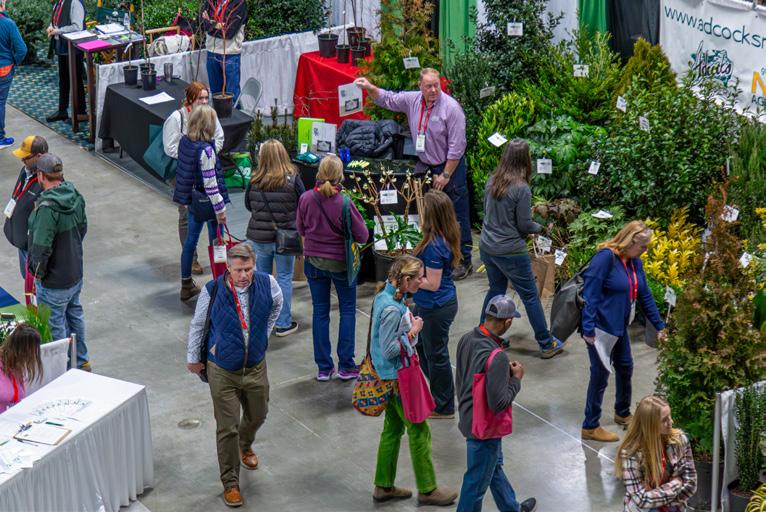
Roundstone Native Seed, LLC.
Rountree Nursery and Supply (Rountree Plantation Inc)
Rusty Mangrum Nursery
Sampson Nursery, Inc.
Sandhills Community College
Sandy’s Plants, Inc.
Santa Fe Tree Company
Saunders Brothers
SBI Software
SCAG Power Equipment
Scapify
Scottree
Sester Farms
Shady Creek Greenhouses
Shady Grove Plantation & Nursery, Inc.
Shady Rest Nursery
Shiloh Nursery, Inc.
Signalbox Analytics
Simpson Nursery
Sink Farm Equipment, Inc.
SiteOne Landscape Supply
Smart Pot
Smith’s Nursery
Sonco Pipe and Tube
Southeastern Growers, Inc.
Southern Ag
Southern Exposure Seed Exchange
Southern Pine Needles of NC, LLC
Specialty Tag & Label
Spivey’s Nursery, Inc.
Spring Creek Nursery
Spring Meadow Nursery
Star Ridge Aquatics, LLC
Star Roses and Plants
Starling Nursery
STI Turf Care Equipment
Stockhaven Nursery, LLC
Stone Center | Landscape & Masonry
Stony Point Nursery and Farms LLC
Stuppy Inc.
Sugar Mountain Nursery
Super-Sod
Surface Nursery Inc.
Swan Mill Nursery
Swift Creek Nursery
T.H. Blue, Inc.
Taproots Horticulture Consulting
Taw Caw Creek Nursery LLC
Taylor’s Nursery Inc.
Tennessee Valley Nursery Inc.
Textraw Inc
The Clay Market
The Greenhouse Company of South Carolina, LLC.
The HC Companies
The Holly Factory
The Perennial Farm
Thomas Nursery, Inc.
Three Volcanoes Farm
Thumbs Up Nursery
Tidwell Nurseries, Inc.
Tim Johnson Landscaping
Timberlake Nursery, Inc.
Tinga Nursery, Inc.
Todco Inc.
Tom Dodd Nurseries, Inc.
Transplant Nursery Inc.
TreeDiaper
Triangle Nursery Inc.
Triangle Risk Advisors, Inc.
Triangle Turf & Ornamental
Turf Mountain Sod
Turner & Sons Nursery
Turtle Creek Nursery Inc.
V & G Topiary
Van Belle Youngplants
Vandemark Farms
Vans Pines Nursery
Vego Garden
Vermeer All Roads
Vole King
Walters Gardens Inc.
Waynesboro Nurseries, Inc.
Wetland Plants Inc
Williams PlantWorks LLC
Williford’s Nursery
Willow Oak Nursery
Wind River Growers
Worthington Farms, Inc.
Wyatt-Quarles Seed Company
Yepzy
A heartfelt thank-you goes out to all the dedicated volunteers who helped make Green & Growin’ 24 a success!
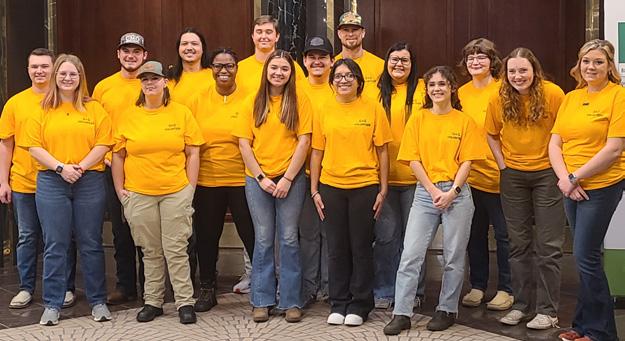
Green & Growin’ 24 owes much of its success to the outstanding team of volunteers who contributed their time and efforts. This year, we were privileged to collaborate with volunteers hailing from the University of Mount Olive and Pitt Community College, encompassing both students and faculty. Additionally, we were fortunate to enlist the support of industry experts associated with North Carolina Cooperative Extension offices throughout the state. These gracious individuals committed themselves to ensuring a smooth check-in experience for attendees, skillfully managing the flow of participants attending educational sessions and the Marketplace, and played a vital role in introducing speakers during educational sessions. We want to express our sincere appreciation to all those who volunteered their time and expertise!
Jennifer Bradley
Kaleb Buckingham
Reagan Carver
Jadon Cook
Jason Davis
Jasmine Gonzalez
Sarah Holloman
Payton Kennedy
Tatiana Martinez
Timothy Warren
Pitt Community College
Karlie Bartlett
Chris Childers
Mason Norris
Jonathan Oxendine
Erin Rodgers
Taelor Scales
Hannah Worrells
Payton Berry
Sam Boring
Sarah Christas
Rhiannon Goodwin
Taylor Jones
Cari Mitchell
Emilee Morrison
Luke Owen
Kellee Payne
Melinda Roberts
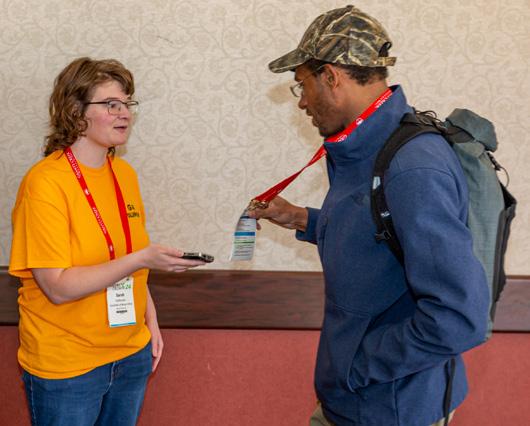
Green & Growin’ has been a great event where I have enjoyed volunteering the past two years. It has given me many opportunities to further my education, encouraged me to meet new people, and helped me become more empowered and aware as a woman in the green industry. I am very thankful to have had this experience with NCNLA, and I look forward to continuing to volunteer with them.
— student volunteer Reagan Carver, University of Mount Olive
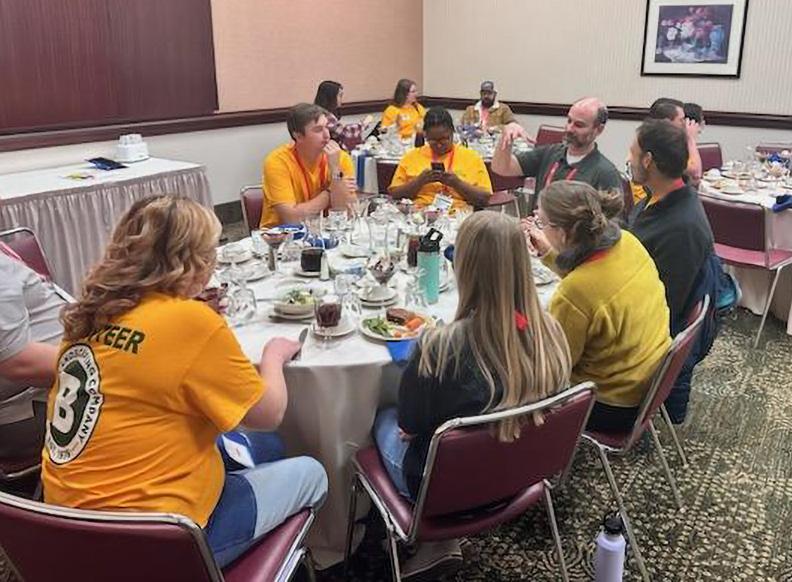
I have volunteered at Green & Growin’ for the past two years, and it has been a great opportunity to further my knowledge, meet many different people and learn about the green industry. I sincerely look forward to volunteering in the future.
— student volunteer Payton Kennedy, University of Mount Olive
Beyond students, faculty and extension agents, numerous other individuals generously dedicated their time to support the Marketplace. The move-in/move-out crew worked tirelessly and played a vital role in both the setup and breakdown of the trade show floor, exhibiting tireless efforts in the days leading up to the opening of the Marketplace on Thursday, January 18. A heartfelt thank-you goes out to everyone who carved out time from their hectic schedules to make the Marketplace a tremendous success.
Staging
Landis Hall, Carroll’s Plant Center
Ariel Montanez, Pender Nursery
Tod Williams, Worthington Farms
Blue Door
Casey Nursery
Hunter Casey
Currin’s Nursery
Richard Currin
Fairview Nursery
William Westbrook
Five Oaks Nursery
Abbey Cole
Chris Cole
Jericho Farms
Brent Langston
Johnson Nursery
Chason Johnson
Old Courthouse Nursery
Jeff Allegood
Panther Creek Nursery
Alan Erwin
Rhodes Nursery
Nick Ray
Danny Rhodes
Sampson Nursery
Jon Gregory
Smith’s Nursery
Mitch Smith
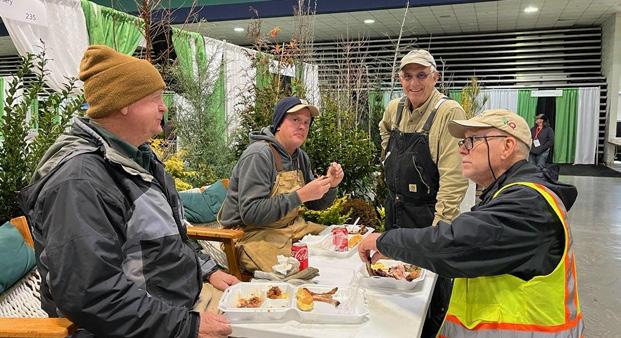
Swift Creek Nursery
Jamie Thomas, Blue Door Captain
Watson’s Nursery
Amanda Jurisich
Worthington Farms
Josh Kennedy
Mike Worthington
Green Door
Hefner’s Nursery
Mark Gantt
North 40 Nursery
Jeff Gragg
Pro Green Inc.
Hunter Clark
John Clark
Noah Clark
R.M. Gragg & Sons Nursery LLC
Justin Clark
Chad Gragg, Green Door Captain
Noah Gragg
Oscar Michel
Roger Coffey & Sons Nursery
Douglas E. Gragg Jr.
Gerardo Hernandez
Antonio Servin
Stoney Point Nursery
Jonathan Bowles
Hunter Dagenhart
Upton Nursery
Tommy Woodie
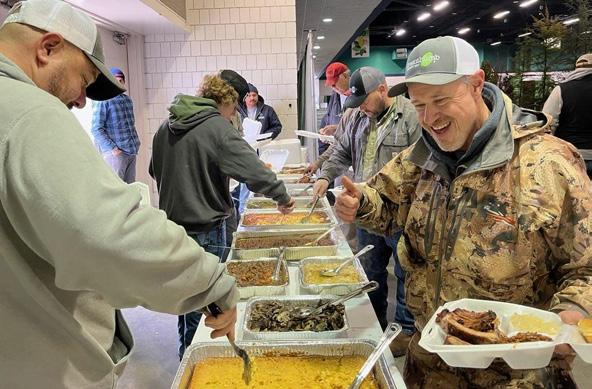
Red Door
Gossett’s Nursery
Vicente Cisnario
Hilario Garcia
John Gossett
Michael Gossett
Philip Gossett
Pascual Mendoza
Greenthumb Nursery
Cole Cagle
Kevin Cagle
Robby Cagle
Robbie Potts
Powell’s Nursery
Salvador Callejas
Florencio Mejia
Abelardo Urbina
Pritchett Farms Nursery
Edgar Pritchett
Vaughn Willoughby
Spivey’s Nursery
Julian Guzman
Shanon Spivey,
Red Door Captain
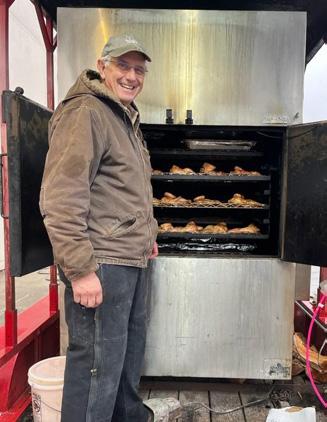
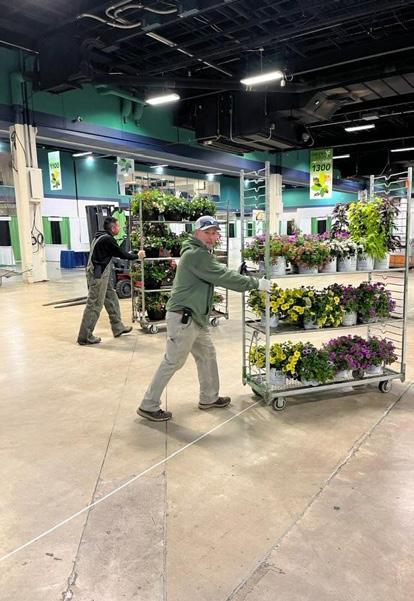
Special appreciation is extended to Skip Warrick and his esteemed “A-team” of assistants: Mike Hudson, Trey Warrick, Mike Worthington and Mark “Bubba” Presnell. They went above and beyond, preparing and serving the most delectable lunches to the crew on Tuesday and Wednesday during move-in. For those yet to savor Skip’s barbecue expertise, featuring barbecue, ribs and fixins, it’s a culinary experience not to be missed. Rumor has it that some individuals volunteer specifically to partake in these legendary lunches. If you’re interested in joining the move-in/move-out crew for Green & Growin’ 25, feel free to contact Kathryn Stansbury at kstansbury@ncnla.com.
While it’s possible that we may have overlooked a few names, we want to express our gratitude to all individuals who devoted their time and effort. Your hard work is truly appreciated!
Each year at the Green & Growin’ Marketplace, exhibitor booths are meticulously judged for awards in four categories: Best Allied, Woody Ornamental, Best Floral and overall Best in Show. Our esteemed judges made their decisions by evaluating overall appearance, relevant product content, the “wow” factor, creativity, special features and how well each display aligned with its designated category. Congratulations to this year’s winners for their outstanding booth presentations!
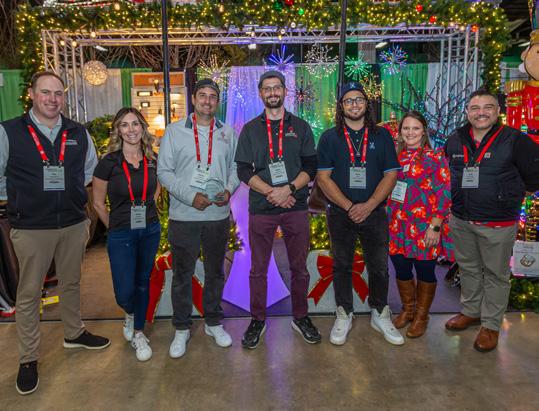
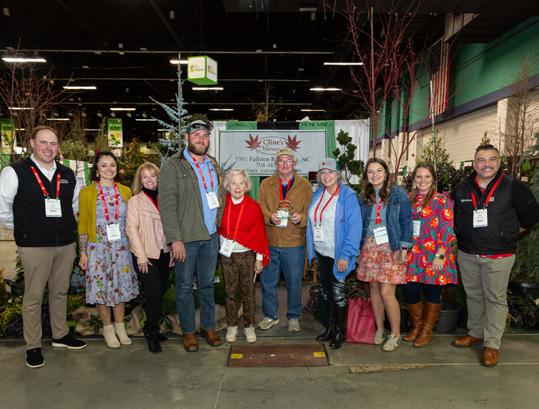
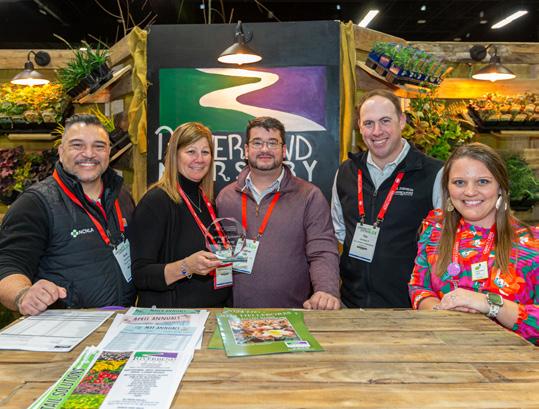
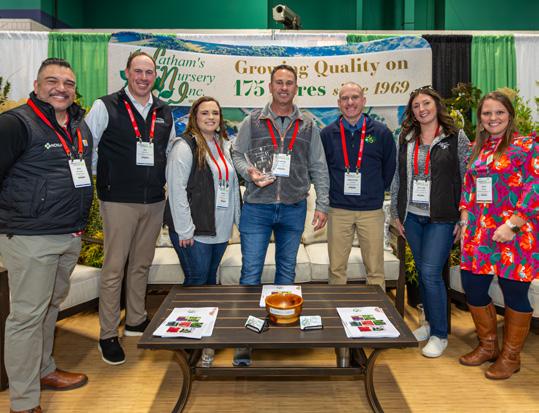


|Irrigation
|Outdoor Living
|Landscape
|Equipment


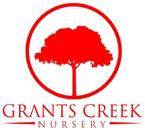


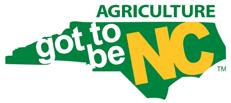

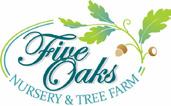


























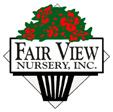

Join NCNLA members and industry colleagues for a morning of golf, followed by an awards lunch.
Proceeds benefit the NCNLA Scholarship Fund.
Friday, June 21, 2024
NEW TIME 9:00 AM Shotgun Start
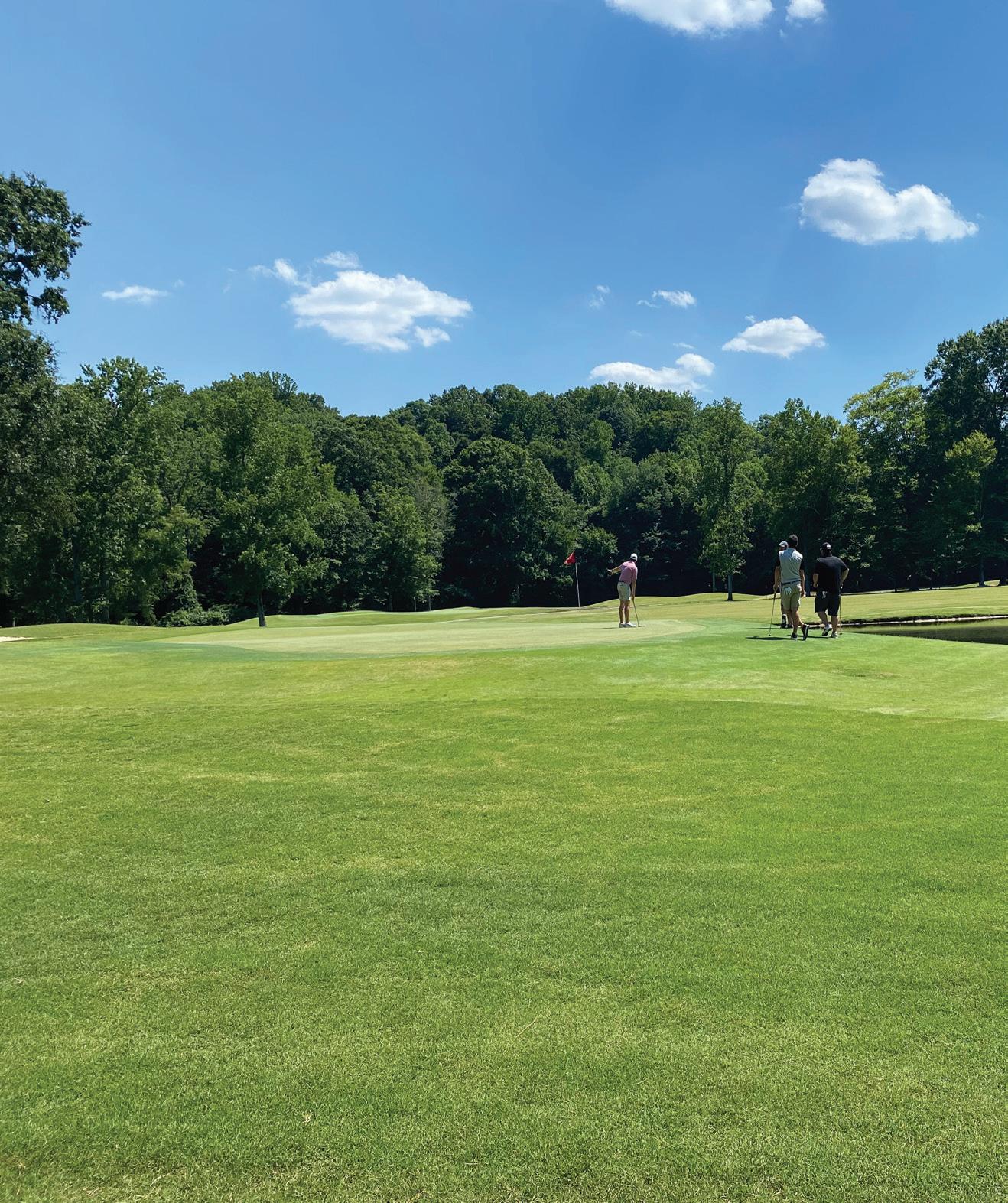
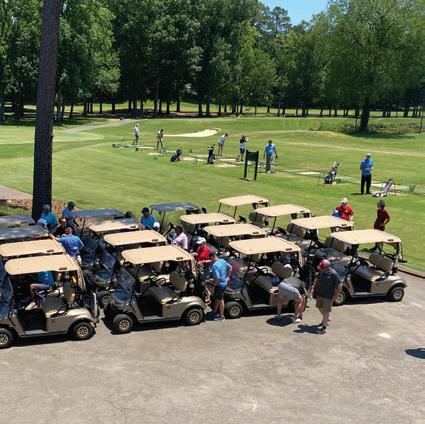

Lochmere Golf Club
2511 Kildaire Farm Rd. Cary, NC 27511
Friday, June 21, 2024
NEW TIME! 9:00 AM Shotgun Start
Awards lunch to follow tournament
I want to support the 2024 Robert Cagle Memorial Golf Tournament and help raise money for the NCNLA scholarship fund through the following selection(s):
$475 Foursome w/Mulligan Package*
$575 Foursome w/Mulligan Package* + Hole Sponsor
$125 Individual Player w/Mulligan Package*
*Mulligan package: two mulligans, one throw and one tee buster
$250 Hole Sponsor (non-exclusive)
$250 Closest to the Pin Sponsor (sponsor to provide prize)
$250 Longest Drive Sponsor (sponsor to provide prize)
$250 Longest Putt Sponsor (sponsor to provide prize)
$500 Meal Sponsor (reserved for Annual Sponsors only)
$750 Beverage Cart Sponsor (1 exclusive opportunity available)
$250 Provide your own giveaway (examples: branded golf balls, t-shirts, towels, golf tees, koozies, etc.). Contact Wendi Doak at wdoak@ncnla.com or 919-816-9119, ext. 1002 to confirm what you will be providing.
Additional customized sponsorships are available upon request. For more information, contact Wendi Doak.
Mail your completed form and check to the NCNLA office at the address below. You can also return the form via email to registration@ncnla.com, and you will be invoiced for payment. The sponsor deadline is May 22, 2024.


